#now it's time for terry meta
Explore tagged Tumblr posts
Text
Allegorical Rayllum in "Dreamer's Nightmare"
Really thought I'd walk out of Dreamer's Nightmare thinking more about the broyals + Harrow, or an Ezran centric meta (and there may be ones to follow) but this was something that stuck out to me on my first two read throughs and was a truly unexpected part of the graphic novel so...
This is exactly what it says on the tin, and full spoilers for all of Dreamer's Nightmare.
Let's go
Crumbs
The biggest crumb(s) we get are arguably Callum 1) recognizing the mural as belonging to an elven temple, and 2) this panel below that definitely made me chuckle.

I also, accordingly, lost my mind over the elf-toy from 1x04 being a gift given to Ezran / the boys by the end of the comic, which seems to be modelled both after the Moonshadow elf featured in the story, and of actual canon Rayla per 1x04 itself, down to the girl having a similar hair style, markings, and being a sword wielder. (This also informs our basis for the next section.)



However, the definitely meatier stuff has to do with the Dream Warden (DW) creature, its history, and Ezran's interactions with it, so that's where we'll be focusing, and subsequently big spoilers for the graphic novel. Last chance to get out if you hadn't read it yet!
Identity and Loss
So there's a few things we learn about DW and their little mortal friend.
Long ago, a Dream Warden, still new to the world, befriended a mortal child. This violated the traditions of its kind, but the Dream Warden was young. Each night, it flew to the silver shores of sleep and each night found its friend there, wide-eyed and waiting. And beneath the watchful stars, they could adventure together through the child's dreaming world. But one night, sleep blossomed into dream, the Warden found itself alone. The child did not appear that night, nor any night that followed. The Dream Warden searched dream after dream for its friend. Sorrow became fear came anger, and soon the Warden left nothing but nightmares to flower in its wake.
This happens, of course, because the child has grown up and left their old dreaming behind, and the relationship between youth and dreams vs adulthood (actual and perceived) is something the comic is likewise interested in. Callum wants to be grow up so he can help, but as Harrow says, "Part of being grown-up is looking out for others," and there are many moments Callum acts far more like the 9-11 year old child that he is here than an adult, even if he is definitely more mature by the novel's close than he was at the beginning (and so on and so forth into S1 / beyond).
It is these two things — the abandonment of dreams (a life with Callum) to taking up an 'adult' task (assassinating Viren) in the name of "looking out for others" (Callum, the world) — that leads to Rayla leaving in Through the Moon. This is due to having fallen out of favour the idea that she's "stronger together" (BH) with anyone and missing the memo the boys receive/believe from Harrow—and their mother's actions—that they are "safest together".
So we have a Moon creature (seemingly) befriending an elven (mortal) child, even though doing so goes against the traditions of its kind. Then one day the Moon elf disappears in the action / guise of growing up, leaving the DW despondent, angry, and alone. Saddened, fearful, and furious they leave behind nightmares. [Sidenote: I do love the consistent metaphor of blossoming to flowering, it's nice.] Eventually, they fall into a deep depression and slumber.
This is a pretty close beat-for-beat of Esmeray as well, down to being left behind by a creature connected to the Moon arcanum who specifically "mysteriously dies"/leaves and subsequently causing an icy, snowy storm that shrouds the heavens (hides the starlight) until a return and/or reconciliation.

When she disappeared, she left you all alone. In pain. The storm isn't your rage. It's your grief. Your loneliness. On moonless nights, you miss her the most.
All of this is, however, mostly subtext, even if Callum and Esmeray match up in S6 and S4 in more than one instance, so I thought going through Dreamer's Nightmare that Callum's evident parallels to DW, and even Rayla to the moon child, that it would likewise remain subtext. Imagine my surprise when it wasn't.

Ezran
I've talked about Ezran and Rayla and their parallels before, decently extensively. Despite having different personality presentations, they have very similar cores. Both are less inclined towards violence in spite of Ezran having access to power and in spite of Rayla's upbringing, both have received prejudiced consequences for things they couldn't control (the assassin hit out on Ezran due to his father's crimes / Rayla being Ghosted partially because of her parents' as well as being seen as a monster), and these things contribute to them questioning perceived monstrosity more than, say, Callum, would.



We see this even reflected in Dreamer's Nightmare, where Callum despairs and in a desire to protect him and Ez, defaults to, "If I can't fight it, what can I do?" versus Ezran stating, "I can't fight you, and even if I could, I don't want to."
And while I have other thoughts on Callum and the 'monster' motif / label that you can read here, what I want to reaffirm here is the way through Ezran's connection with the Dream Warden, we also highlight his understanding of Callum both in the graphic novel and while Rayla was away / in the early days of her return.


Callum as a character has always been a character with a tenuous grasp on his own identity, especially in arc 1. He states in 2x04 that "when I got magic, I finally felt like myself" in trying to explain "how I've lost that. I'm just trying to find my way back". I think we can draw a point of comparison between Callum losing magic and not feeling like himself and Callum losing his mother and not feeling like himself, both in the immediate aftermath and repeatedly on the anniversary of her death. We also see elements Ezran mentions of Callum not feeling like himself (not drawing, his anger) that come out in S4 / 4x01 and 4x02, notably while Rayla was gone. It's only after she returns and they've begun to reconcile that we see Callum draw again (5x02) for example and indeed be more relaxed (somewhat) with his temper.
Through these periods, though, Ezran has been his cornerstone. Callum was lost in grief with Sarai, but finds his way back to Ezran; Ezran guides him out of the tower in 1x03 and into the quest to Xadia; Ezran is there even when Rayla is not, and Ezran encourages him to open up, recognizing there just as he does with the Dream Warden:

But it's easy to lose ourselves if we don't let others in. And I don't think you want to be angry and alone forever.



So Ezran through his assertions and understanding of both his brother in the comic's present, as well as the Dream Warden, takes everything that was previously subtext for Callum in the graphic novel as a character in the context of how he responds to loss (specifically Sarai and Rayla's loss), and makes it text:
DW lost their Moon arcanum connected best friend and fell into a furious sorrow, and that sorrow being disturbed is what brings the angered splintering back in full force. Dreamer's Nightmare ends, of course, with the creature being pacified and presumably going to bond with more new children, rather than just being shut away forever. Since Rayla isn't fully gone, and since she comes back, his tale of moon-friend-disappearing related woe ends differently with the full reconciliation, but the period of processing the grief and anger to "to hope and maybe forgive and love again" (4x03) remains the same.
This bodes well for theories regarding his love for Rayla and despair/desperation over losing her being what turns Callum into a 'monster' in S7, by which I mean Callum believing himself to become a monster through helping Aaravos / dark magic corruption, and believing himself to be something worth killing (4x07, 6x03) should those things transpire. But as Ezran says, all it takes is one (or two) people seeing you through the periods of anger, sadness, or splintered corruption to bring you back to your whole self again. Given the basis for Dreamer's Nightmare, I'm extremely hopeful that both Ezran and Rayla will have their roles to play in bringing Callum back to himself, just as Ezran's bonds with Callum and with Rayla will undeniably play a part in bringing Ezran back to himself, too.
With all this in mind, let's talk about the doll.
The Elf Toy


So the elf doll haunts me, nor is this new, by any means. I posted a bit about it when Dreamer's Nightmare had just come out, but I've had my eye on this thing since I first noticed the game motif some time after S3 aired. While it's since expanded to include Aaravos and his pawns (and dark magic) more directly in arc 2, said game motif in arc 1 mostly referred to the Key of Aaravos, with the motif and key itself being properly introduced in 1x04: "This is the game room, cube should be in there" / "It's a toy. A piece from a children's game."
A game motif oriented episode that then, therefore, likewise introduces a toy Rayla stand in, and one that Dreamer's Nightmare, purposefully being released before S7 for evident reasons for both brothers at least, harkens back to directly.

Like I think I can speak for all of us when I say I never thought we'd see the damn thing again. It's in 1x04 primarily to just emphasize how humans (namely Amaya) have always seen elves as scary monsters, it looks like Rayla to drive that subsequent point home, and yes it's a toy in an episode with the series' core Game Motif being centred for the first time, but that doesn't mean it's automatically connected. I'd like it to be, I think it'd be fun and very on brand for TDP's style of writing if it was.
That's said, let's go over it from various angles, starting with order of events:
Kid has elf toy, is buried under rubble
Callum and Ez pull them out and usher the kid to safety
The boys / Ezran resolve the conflict and defeat the 'monster,' with Ezran realizing it's not a monster, and instead relating it to Callum explicitly
The boys receive the elf toy as a gift
The most direct reasoning here, then, goes twofold:
Placing the toy here adds depth to Ezran thinking back in 1x04 about what makes something/someone a monster, which is the subject of the conversation at hand, and how it was incorrect
It is here in DM because we're revisiting the Banther Lodge next season, and there's going to be an emphasis on seeing people (others towards Callum; Ezran towards Runaan) not as monsters / reminding Ezran of his love for Rayla. We may see the toy, probably not, but that could be the thread
Therefore, that is where I think I'd leave it in terms of being a toy with a deeper purpose... if not for the fact it's referred to as a Gift. I've talked about the gift motif here in TDP and how arc 2 makes it much more of an emphasis, largely in regards to magic and magical sources of power:


However, where it's most notable in the 'gifts' Aaravos gives: his pawns are not just his pawns, but often tethered to him through magical objects. Claudia's current pawn intro has the Sun staff, which was given from Aaravos to Viren to her; Callum has the cube, a similarly ancient relic passed down through generations; "Lay it down? But it was a gift," Ziard says, the Staff clutched in his hand, and Viren later cites it explicitly a toy: "You had a lifetime to play with your toys, but now you hide them all away or destroy them."
To the point that throughout the various gifts given (the moon opal pendant, Rayla's goodbye letter, the sun orb from the Sun, the trio's gifts of sacrifice to Rex Igneous, Janai's sword and Miyana delivering the sun seed, and more I'm sure) the only things referred to as / that are both gifts and toys are the Key of Aaravos and the Relic Staff.


And, now thanks to Dreamer's Nightmare, the Elf (Rayla) doll.
Obviously this doesn't mean the elf doll is an ancient relic, or powerful, or even important, I think. Not on a literal level. But the final pages do tease it's a bringer of misfortune, which Rayla absolutely is (or is supposed to) when she lands on the boys' doorstep 6-5 years later. She's assumed to be a bringer of misfortune at said Banther Lodge where both the toy and cube are found, which is why she's taken captive.
What characters thus far receive things in the graphic novels, too, comes into play later. Claudia's map to the unicorn she acquired in The Puzzle House seemingly fulfilled its purpose pre-series with her tracking one down already, only to have another purpose in mind as of 7x01.
It's not beyond the realm of possibility to me, therefore, with all this in mind:
The doll was included as a throwback to 1x04
It will have importance
This importance will possibly relate to Rayla
If the motif of it being a gift and a toy is relevant, than the objects on par with it are the Relic staff and Key of Aaravos
Something something "Rayla's life is a fair exchange for the Key of Aaravos" because we all know what we're doing here by now
In summary: you lost your Moonshadow elf best friend and that caused you to become a monster / nightmare ("we had to fight our own people, it was a nightmare") and Dreamer's Nightmare just expected me to feel totally normal even before interweaving the gift motif into the game/toy motif with the damn Rayla stand in doll from 1x04 of all episodes. Yeah.
And that's really all I got for this one, but I hoped you enjoyed the allegorical thread break down and the game motif theorizing!
#rayllum#tdp#tdp meta#the dragon prince#tdp spoilers#dreamer's nightmare#analysis series#analysis#parallels#monster motif#theme: identity#now it's time for terry meta
59 notes
·
View notes
Text
Ok this isn't gonna be structured at all but I'm thinking about season 9 of Shameless and specifically about Fiona's departure from the show; A majority of the fandom takes this as a positive moment for her character and as a victory for her, finally putting herself first after years of self sacrifice. But I'm just thinking to myself: is this not exactly what Monica did?
Monica continuously left the kids on their own due to her own mental struggles, often justifying it like she does in season 1 by blaming Frank, or in season 2 by saying that the kids are better off without her. She is held accountable by the fandom for this, rightfully so, because she had a responsibility to those children, and regardless of personal circumstances, she should have been there for them. In season 2, she even acknowledges this, stating that she wants to stay in the mental hospital so she can get better and be there for the kids. This seems to be a constant struggle for her character; wanting to be with her children but struggling with her mental health, drug addiction, and her personal relationship with Frank. All that being said, despite her character being sympathetic, her actions are condemned by fandom.
However, Fiona leaving in season 9 is not seen this way at all. Now, to be fair, most of the children were adults by this point, so she wasn't leaving a minor to take care of five other minors whilst dealing with an abusive alcoholic father. However, Liam was still very much a child, and legally under her guardianship, yet she still leaves him in the care of Lip and the other kids, despite then all having lives of their own as well.
Throughout the early seasons, specifically 1-3, it is brought up continuously how Fiona taking care of the kids is going to come at the sacrifice of her own life. In season 1, she has the opportunity to leave with Jimmy to pursue her own happiness, but she turns it down in order to stay and support the children. In season 2 she reluctantly puts her trust in Monica to assist in helping with the kids in order to pursue a higher position in her work at the club, but ultimately returns to the status quo when Monica suffers from an episode. In season 3 she gains guardianship of the kids, despite the judge telling her outright it will come at the cost of her own freedom, and she will be obligated to care for these children over herself. She KNOWS that she is giving something up in these moments. She KNOWS it is a sacrifice, and she still makes the decision to move forward with shouldering that burden.
This isn't a complaint of her character, I actually find this struggle of hers to be one of the reasons I find her so compelling. She is only 21 in season 1 and is the main provider for her siblings, who at this point would be lost without her. She is only 22 when she gains guardianship. It is valid to look at her situation and realize that she is sort of backed into a corner. How could she in good faith leave her siblings to fend for themselves? How could she pursue something for herself when all she's known since she was 9 is self-sacrifice and putting others first?
However, I think it's also valid to criticize her actions after she gains guardianship. Even as soon as season 4, her shortcomings of being a guardian make themselves more known. Because, before she gained guardianship, she had no obligation to look after these kids, and her attitude, as seen when discussing Karen's pregnancy with Lip, of "I'm not their mother" held weight, because she wasn't their mother. She had every right to put her own wellbeing above others in seasons 1-3 if she wanted to. However, in seasons 4-7 especially, you can see this start to deteriorate.
Her lack of concern for Ian being missing in season 4, despite him only being 17, as well as her carelessness with having coke in the house when there's a toddler wandering around unsupervised. Her stating to Sean in season 6 that she doesn't want to be the one to raise the kids anymore, or her willingness to not support Debbie in her pregnancy despite Debbie only being 14/15 and still legally being under Fiona's care. Her wishing to no longer be top of the emergency contact list in season 7, even for Debbie and Carl who were still minors and legally under her care, and suggesting to put Kev and V above her despite them having their own children.
Her being legally guardian of these children changes the standards for how she should care for them, and I think it's compelling to watch her crack under that unexpected pressure. However, I think it's valid to find her care of the kids after gaining guardianship less than ideal. Most of the fandom seems to disagree, though.
Then, come season 9, she leaves. After suffering an extreme downsprial and struggling with alcoholism, she decides it's best for her to leave. To be honest, this would be the happy ending to her character people make it out to be if it weren't for Liam. Because all the other children are adults, she has no legal obligation to look after them. (Unless Carl was also a minor, but I forgot, I think he was 18, but the ages are so wonky on this show I can't be sure.) However, Liam is legally still her responsibility. Still, she leaves him behind and asks Lip to look after the kids, despite him just having had a baby of his own and struggling with his own personal battle with alcoholism. Debbie also has her own child at this point so she can't properly care for Liam, Ian is in prison, and Carl is too young (and too Carl) to reasonably take on the role of caretaker here. And, of course, Frank is out of the question. So, really, it was similarly unfair of her to leave that responsibility on them, as it was for Monica to leave it on her. Less so, of course, but still unfair.
I just can't help but think that this is at least similar to the ways Monica would leave. Obviously, to a less severe degree, but Fiona still backed out on an obligation she had to a child legally under her care. Although Liam was in a far better position than any of the kids were when Monica left, Liam did still struggle with the loss, as seen in season 11 when he starts sleeping on the streets, unsure of who is supposed to look after him.
I love Fiona. She's in my top 5 favorite characters on Shameless, but I find a lot of the fandom puts her on a pedestal and refuses to acknowledge her shortcomings or the way that she perpetuates the cycle of addiction and poor parenting once she becomes guardian. Her leaving in season 9 didn't feel like a girlboss win moment despite the show portraying it as such, I found it to be more her continuing the cycle set by Monica, just as throughout the season she had been continuing the cycle set by Frank with her addiction problems.
I honestly find her character to become a lot more rich and interesting when you acknowledge her flaws instead of believing she's justified in all her actions or by removing her accountability and blaming her poor actions on the way she was raised. As she says in season 4;
"It's me, Lip. Not Frank, not Monica. Not nature, not nurture. It's all me. I'm 23. Can't be about how much they screwed us up anymore."
And as Lip tells her;
"You're not perfect, Fiona. None of us are."
#shameless#fiona gallagher#the first meta ive done in awhile#i know its not dbh and this blog is mostly dbh but my hyperfixation has shifted for awhile now so#i think of the entire shameless cast of characters all the time#i love fiona so much but she is not a good person#nobody on shameless is a good person and thats the point#i hate fiona slander but i dont think its wrong to acknowledge that shes done some fucked up things#and that she fell short as guardian for her siblings#imo the only characters who deserve slander and are irredeemable are frank and terry literally anybody else and its a no#frank and terry i can hate but anybody else and i can see their character from different sides#yeah you can dislike some characters or find them annoying or boring but i cant really hate them#oh also kash ned matty and jody fuck those guys#anyways love fiona but hold her accountable please thanks bye
8 notes
·
View notes
Text
The year is 2025, and here I am, still very troubled about BBC Sherlock. Now, it's been a while since I wrote any Sherlock meta, but there's something that's been bugging me, and I’d love to get people’s input and thoughts.
I'm a screenwriter—not a professional one, but an autodidact. I haven’t had anything produced, but I have written several original screenplays. One of the most basic things you learn as a writer in general, and especially in screenwriting, is the concept of the character arc. It’s the art of starting a character off as one thing, taking them through a process of deconstruction or challenge, and letting them emerge as something different.
An exercise I enjoy is watching films or TV shows and analysing a character’s arc. I try to spot hints of how a character will change by the end of an episode, a season, or the entire series. That’s part of why I particularly love Michael Schur’s shows—Parks and Recreation, The Office, Brooklyn Nine-Nine. In the Michael Schur universe, character arcs are blatantly laid out for you in the pilot episode. There’s absolutely no need to philosophize or guess: the characters often state it themselves, or it’s clearly expressed through others.
Take, for example, Michael Scott.

In the Office pilot, he’s genuinely a terrible boss and a trashcan of a person. But we’re immediately shown his arc via one simple prop: a coffee mug. “World’s Best Boss.” That’s his journey—to become that boss, if not in the world, then at least in Dunder Mifflin.
Or take Jake Peralta. In B99’s pilot, Terry introduces the squad to Captain Holt with:
“Jacob Peralta is my best detective — he likes putting away bad guys, and he loves solving puzzles. The only puzzle he hasn’t solved… is how to grow up.”
From that alone, you know where Jake is headed. By the end of the show, he’ll still be the squad’s best detective, but he’ll also be a grown-up: a dad, a partner, someone who takes his job seriously and earns the respect of his captain.
In the Parks and Rec original pilot script, Leslie outright declares that she’ll be America’s first female president. In the aired pilot, the message is softened a bit when Leslie says:
“You know, government isn’t just a boy’s club anymore. Women are everywhere. It’s a great time to be a woman in politics. Hillary Clinton, Sarah Palin, me.”
There it is: Leslie’s arc will involve her rising through the boys’ club of American politics and becoming a truly great public servant (and maybe—even if it’s never clearly stated—the first female president).
So now that I’ve set the scene a bit—understanding how a character arc is seeded in a pilot—let’s talk about Sherlock.
What are we told about John and Sherlock in the pilot that sets up their character arcs?
Let’s start with Sherlock, because that one is spoon-fed to the audience—by none other than Lestrade. In response to John’s question, “Why do you put up with him?”, Lestrade says:
“Because Sherlock Holmes is a great man. And I think, one day, if we’re very, very lucky, he might even be a good one.”
That’s it. That’s Sherlock’s arc. The writers are telling us outright: here’s a brilliant but emotionally disconnected man. And the journey ahead of him isn’t about intellect, but about goodness. About connection, humanity, compassion. Becoming not just great, but good. And, if I might add a bit of Johnlock, not just to anyone—but through John, with John, and ultimately because of John.
Now, John’s arc is a little less obvious in my opinion, though just as important—and it’s given to us by Mycroft, who says:
“You’re not haunted by the war, Dr. Watson—you miss it.”
To me, this says: here is a traumatized soldier who never fully came back from war. He’s unmoored, disconnected, half-alive. "Nothing ever happens to me." And the arc we should expect? A man who, over time, things happen to him and he finds peace. Who finds meaning in his civilian life—back in London, in friendship, in purpose, in (perhaps) love. Who, by the end of the series, no longer misses the war.
That’s the setup. That’s what we were promised. Or at the very least, that's what I feel I was promised.
Only… whatever I feel was promised never actually happened.
In fact, Sherlock ends up delivering the complete opposite. In Seasons 3 and 4, the show leans into Sherlock as a mythic, near-supernatural figure—the “adult who never was a child.” This directly contradicts the idea of humanising him. The sudden introduction of Eurus shifts the focus from internal growth to external spectacle. His evolution becomes a reaction to trauma, not a conscious transformation toward goodness.
By the end of The Lying Detective, Sherlock is still fundamentally isolated and emotionally unavailable. Despite supposedly learning to “connect,” he doesn’t share emotionally in any meaningful way—not with John, not with Eurus, not with Molly. The “I love you” scene is a puzzle to be solved, not a moment of genuine vulnerability. John and Sherlock’s confrontation at the end of TLD achieves absolutely nothing in terms of their openness or intimacy.
Sherlock's arc—of becoming a good man—is never achieved. Now, we can argue about that, because Sherlock is a softie at times. He is kind. And don’t get me wrong—when Michael Scott leaves Dunder Mifflin, he’s by no means a perfect boss. But he’s loved by Pam, he’s missed by Jim, and the Dunder Mifflin team has learned to respect him in their own way.
I know some of you are itching to shout that Sherlock's arc won't be complete without S5 and in theory, I agree! But! Lest we forget, Lestrade’s “prophecy” (supposedly) comes full circle in The Final Problem:
"No, he’s better than that. He’s a good one."
This, supposedly, is the great moment of The Payoff. Here stands Sherlock, A Good Man™.
Which… always makes me scratch my head.
Is he, Lestrade? Really? What is it, exactly, in those last few days that convinces you of that? What moment between The Six Thatchers and The Final Problem gives you that impression?
Nothing. Really—nothing. This, for me, is absolutely zero character arc payoff.
Now, what about John—who was supposed to come back from the war, or at most, get his adrenaline kicks chasing criminals with Sherlock through the streets of London?
Mary’s death completely hijacks John's growth as a character. Rather than showing John finding stability in his marriage and family (or with Sherlock, in whatever shape that takes), the show strips it all away. And worse, it distances him from Sherlock once more—throwing him into another spiral of guilt and rage, effectively rebooting his trauma rather than resolving it.
The finale gives John no closure. We don’t know where John is emotionally by the end of The Final Problem. Is he at peace? Are we supposed to believe that a happy montage fixes everything? Does he still crave danger? Does he still feel violent impulses toward Sherlock?
I can’t even begin to think when or how Mycroft’s seed of John’s arc—“you miss the war”—comes full circle in The Final Problem. Unlike Lestrade’s line about Sherlock, there’s nothing that brings that theme to any kind of resolution. It’s as though Moftiss forgot to give John a conclusion altogether.
I’ve sometimes wondered if Sherlock’s words to John in TLD—“We might all just be human”—were meant to gesture at John’s arc. But… why would it?
John never struggled to understand that he was human. That wasn’t his arc. That wasn’t his flaw. He knew he was human and he always craved for that humanity from Sherlock. So what, then, was that line supposed to resolve?
I can play devil's advocate here. Character arcs can be negative. A character doesn't always have to have a happy ending, and had Moftiss boldly done that, I would have appreciated it. But they hadn't- they give us a weird ass montage with John and Sherlock happily giggling at Rosie. It's just feels like there's absolutely no conclusion for John, whether negative or positive.
Adding insult to injury, Mary’s 'speech' during the final montage is actually dismissive of their "growth":
“There are two men sitting arguing in a scruffy flat. Like they’ve always been there, and always will.”
Which completely negates the idea that they’ve changed. At that point, they’re not like they’ve always been. John's quite possibly worse than when we met him.
“The best and wisest men I have ever known.”
Again—what’s with the John erasure? Let’s say, for the sake of argument, Sherlock is better now—what makes him wise? And John’s arc was never about becoming wise, so what does that even mean?
“My Baker Street boys.”
Are they? Are they still the Baker Street boys (I hate that nickname)? We’re never told if John and Rosie move back in. In fact, in a Q&A Moftiss declare John does not return to Baker Street.
And that’s just it, isn’t it?
The Final Problem finale doesn’t fail because it was mysterious or ambiguous or hilariously bad or tragic. It fails because it abandons the emotional contract it made with its viewers in the very first episode. It forgets the arcs it promised, the healing it hinted at, the people these characters were meant to become.
We didn't need a happy ending. But we did need a real one.
#my meta#bbc sherlock#sherlock meta#sherlock holmes#john watson#johnlock#moftiss criticism#sherlock season 4#the final problem#sherlock the lying detective#sherlock analysis
240 notes
·
View notes
Text
Now we know What Viren Did(tm), and...
My personal side-eye aside, that denouement is actually an incredibly elegant application of the story's themes, within the scope of restrictions imposed by this particular medium (i.e. a cartoon targeted for pre-teens and younger). Like, I personally assumed for a long time that we would simply never find out the details, because it would be either too grim and/or violent for the story's intended rating or... kind of a let-down. On the surface, what we got seems like the second.
Most of us have looked at Claudia killing the baby deer to heal Soren's paralysis and went "well, it was obviously that, but y'know... worse, somehow," which is a completely reasonable assumption to make. It was definitely what was narratively implied, which makes the supposedly-damning ingredient being "your mother's tears" instead of like... idk, "your mother was pregnant again and I used the life of that unborn child to save you" or something kind of "... oh. Okay, then."
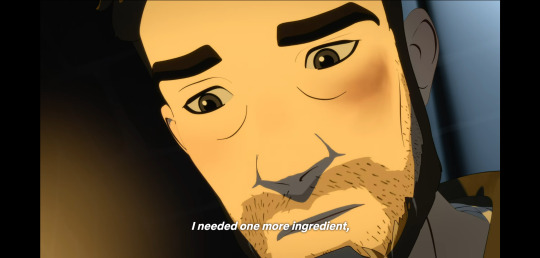
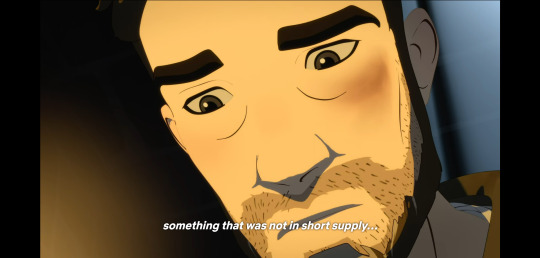

To be fair, that might also be why they went so hard in the IMO inadvisable male-dominated writer room direction of "so I held her down and took what I wanted" to convey the requisite "he's doing A Bad," which is what all my side-eye is toward. But here's the thing:
On some level, dark magic is about violation—of nature, of others, and of the self. Even violation by Aaravos, ultimately.
But it's also not just that.
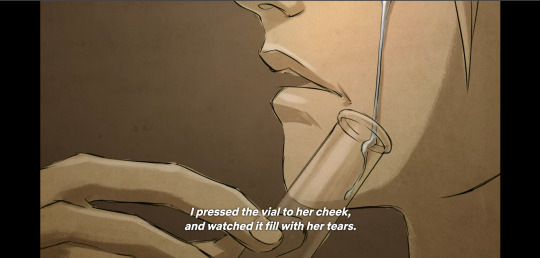
Dark magic also sits at the center of one of the primary themes of the whole story, which is the evil of denying others' personhood. We see it again and again from the angle of the heroic cast: "You keep calling it a monster," "You knew he was a person, just like you," "She's not 'the elf.' She's Rayla." The evil they do not allow to take root is seeing people as things, the place where all other evils begin. (GNU Terry Pratchett, IYKYK.)
So Viren's damning crime, the crime that is dark magic, is this:
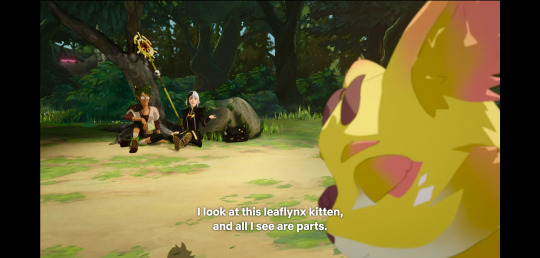
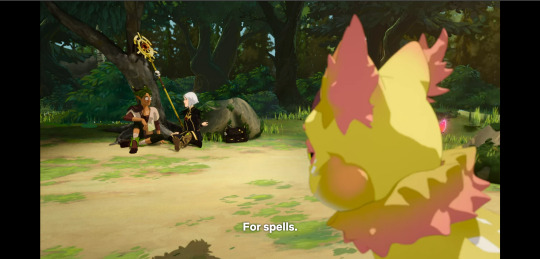
In that moment, he looks at his wife, and sees only a source of what he needs. One that he can take from as he wills. That's why Lissa leaves—Viren has pulled the circle he draws around "people" versus "abstractions, things to be used" in so tightly that she has found herself suddenly on the outside of it. That's not something you come back from, in a relationship.
As for it all being over something as innocent as Lissa's tears, as opposed to something like her blood, her unborn child, her heart, her last breath—that's also, I think, part of the point. It's a renewable resource, harvested without doing permanent physical harm, but it's still a violation of her. This is the ultimate refutation of the "but what if ethically-sourced phoenix feathers" argument as being, for the final time, bullshit.
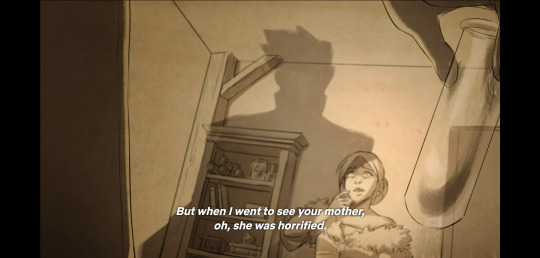
When Viren bursts in looking like he walked straight out of hell and demands use of her tears, could Lissa have given them freely? Sure... but she didn't. Could he have talked her around, if he invested the time and respect for her that would require? Probably, but again, he didn't! He took what he'd decided was necessary, did what he decided he had to do, because he could.
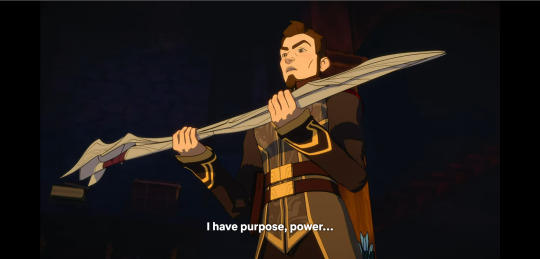
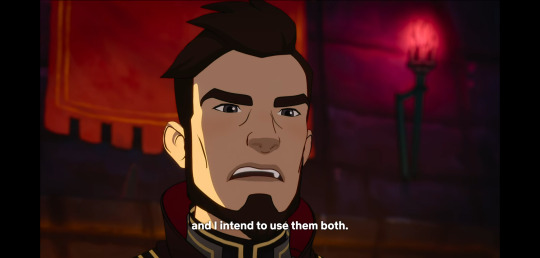
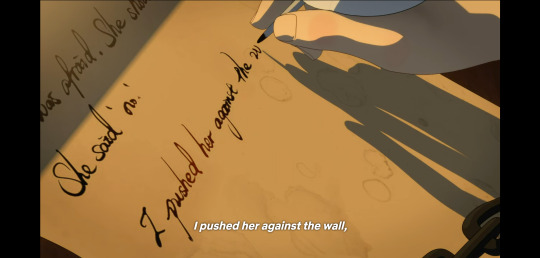
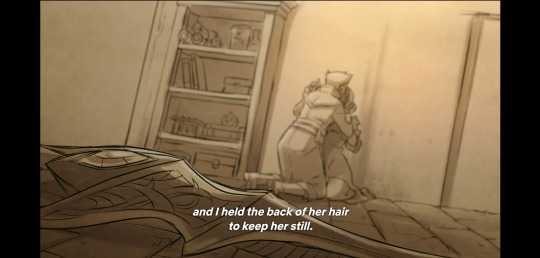
And like, he knew, even then. Because while dark magic twists your perceptions and reasoning, dragging you deeper each time—it can't twist you so much that you no longer have a choice. It will do everything it can to make you rationalize making that choice, over and over, but it can't erase that it is a choice.
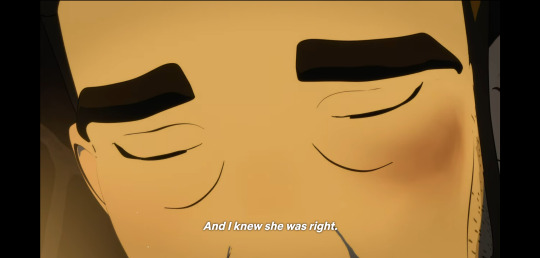
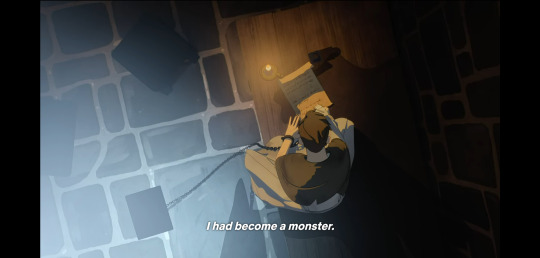
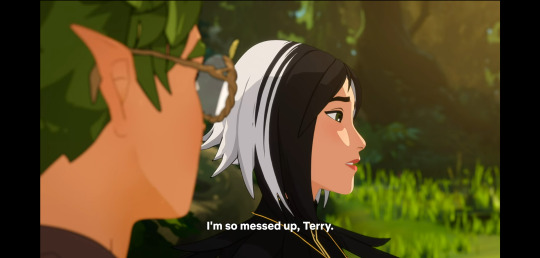
Like, I'm honestly kind of emotional about it because while the surface level watching experience is kind of hmmmmm, it delivers so well on a thematic and meta level that I'm just like idk. Fuck. It's good.
#the dragon prince spoilers#tdp spoilers#s6 spoilers#dark magic#me: please it has not even been twelve hours let me rest#also me: this#kradogsmeta
333 notes
·
View notes
Text
Neil Gaiman's 3 cameos
"But Neil only has one cameo, it's in the movie theater!" Come now. What show are we watching? There is not just one cameo. There are three. The first one is...
The one that actually happened:

but then there is also...
The one that was supposed to happen, but didn't:

See those two people in the background? Lower left-hand corner of the screen? By rights, that should have been Neil and Terry, but Terry was taken from us too soon. Neil wrote this scene intending to do the cameo by himself, in honor of his friend, but on that day couldn't bring himself to do it:
Terry Pratchett and I, had a standing… not even a standing joke, just a standing plan, that we were going to have sushi - there was going to be a scene in Good Omens where sushi was eaten and we were gonna be extras, we were gonna sit in the background, eating sushi while it was done. And I was so looking forward to this and, so I wrote this scene with it being sushi, even though Terry was gone, with that in mind and I thought: Oh, I’ll sit and I’ll eat lots of sushi as an extra, this will be my scene as an extra, I’ll just be in the background. And then, on the day, or a couple of days before, I realized that I couldn’t do it. [...] it was written for Terry and all of the sushi meals we’d ever had and all of the strange way that sushi ran through Good Omens.
The fact that the scene exists at all, I think, can be taken as a cameo. I would interpret it as one of Neil's cameos, since he wrote it as a self-insert of an important aspect of his relationship to the work, but it is also Terry's cameo. Focusing on the empty space where something ought to be is itself a representation of what is missing; there is something to be said for drawing attention to absence, which is what our knowledge of how this scene came to be accomplishes.
There's no good way for me to transition to the next part of this meta other than to encourage you to take a deep breath and remember that Terry Pratchett has been immortalized by this and other works. He is beloved, and not forgotten, and lives on in our hearts, and we honor him by celebrating his works not only in mourning but in the full range of emotion that his works inspired in us, including laughter.
Because this next part is just silly.
Neil's AU Gary Stu cameo:
Neil Gaiman has told the story multiple times about how a careers advisor tried to redirect his life course from storytelling to... *shudder* accountancy. Here's one quote [source]:
Gaiman: I very much wanted to write comics. I remember as a kid, I was 15, and I had a meeting with an outside careers adviser. I was asked, “OK, well, what do you want to be?” And I said, “Well, I really want to write American comics.” There was a long pause, and then the outside careers adviser said, “Well, how do you go about doing that then?” I said, “You’re the careers adviser. You tell me.” And then there was another seriously long pause, and the adviser said, “Have you ever thought about accountancy?” I said, “No, I have never thought about accountancy.” And then we just sat and stared at each other.
We are all very lucky that teenager!Neil decided to completely disregard this advice, but Good Omens S1E2 contains a character that seems to resemble who Neil would have become (or thought he would have become) if he had let that careers advisor drag him into a life of bean-counting mundanity.

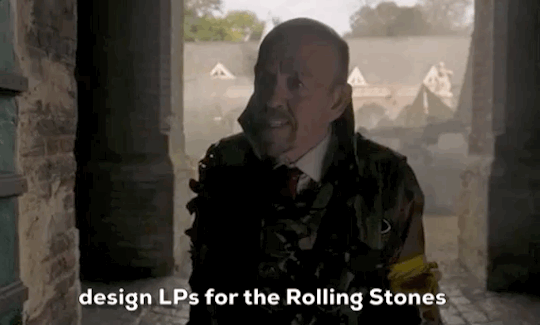
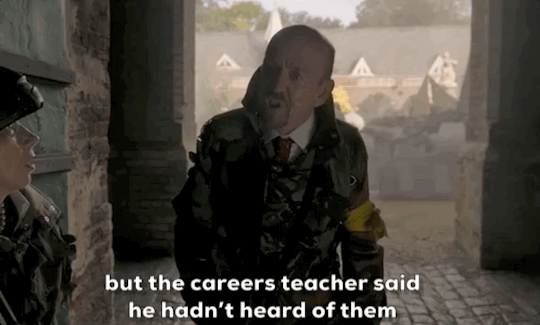

We may not see Neil's face in this scene, but we do get to experience his existential dread of the what if: what if I had never become a storyteller? What if I had listened to that wanker, and lived a life without following my dreams?
I'd say it counts as a cameo.
#good omens#good omens meta#neil gaiman#cameos#this meta somehow got a second life I have no idea how or why but we’re on our way to being blessed by Beelzebub
788 notes
·
View notes
Text
Yandere!Meta!Otome Love interest X GN!Isekai!reader
details: Isekai, angry yandere, reincarnation
warnings: man handling, nonconsensual kissing, threats of violence (not towards reader), possessive behaviors, obsessive behaviors, implied stalking, allusions to infidelity, death by old age
You didn't feel it when you died. You were already so old. It was peaceful in your sleep. When you awoke you noticed so much had changed. Your skin was smooth and no longer loose. Your hair was soft once more and all the pains in your body were gone. The room wasn't one you recognized either. Well... it was familiar but you couldn't remember from where.
You approached the mirror and your eyes went wide when you realized. You hat turned into the protagonist from your favorite phone game! The very game you had spent so many hours in when you were stuck in your bed and could do nothing else but play games and watch TV. Your grandchildren always said that it was "cringe" for someone your age to play games like that but you didn't care. The boys were so pretty and charming.
Your favorite boy was one named Caspian. He was aloof and mysterious and his route was only playable when you had romanced all the other boys. The thing was, you didn't have to wait that long. You had played his route so many times you practically knew it by heart. You knew just the ways to act differently from the original route to make him curious about you. You knew everything to say to wiggle your way into his heart.
Kissing him in real life was so different from how the game had always described it. He tasted like black berries and moonlight. You never understood what the game meant when it described him like that but now... you did. And you understood how sweet and passionate he was. It was better than any man you had ever kissed in real life. He was better than any man you had ever loved in real life.
You got to redo all of your favorite scenes with him. When he saved you from wolves, when you cooked together, even some of the scenes you had originally had to pay money for. You knew what to say. You had payed for the knowledge in your past life. You lived through the whole route, just as you remembered it. Part of you had worried that when you finished the route it would all go black and you'd just be gone but... it didn't. You got to live on and experience everything beyond the story.
It was hard to know how to act at first since you didn't have the guide but eventually you just started expressing your real personality. Surprisingly, that didn't put him off. Being who you really were made you love him even more. You got married and moved in together. Each day he would come to wake you with a smile on his face that you hardly ever saw in the game.
"Good morning, beloved!" he would always say.
The two of you grew old together and eventually you died, just like the death you had had the first time. Still, although you two had a whole life together, you never truly did come to see him as anything more than a character.
When you woke up again you were back at the start of the game. Oooooh. So this is how it worked. You preceded to date and have a life with every single boy. Issac, a flirty bad boy, Terry, a golden retriever, Leo, the princely type (and the actual prince), and Gregory, the tsundere. Each one was an amazing experience but you noticed something odd... Caspian didn't act like he did in the game.
In the game, he would always avoid the MC and treated them like they werenent worth their time. Now, he was always catching you berween scenes, trying to strike up conversations in the hallway and listening to you silently in group scenes. He never payed any attention to the MC... what was different. Not only that, but every route you went through, he seemed more and more intent on interacting with you and getting to know you. By the end he was even flirting with you on occasion and sometimes, in payed scenes, you could swear you felt eyes on you through the window. This... wasn't supposed to happen.
Finally, you had been through all the routes. This life was going to be very exciting because you had a huge plan for this one. You were going to go against the script of the game, act as your self, and see what happened.
That's what you thought, anyway.
Shortly after waking up on day one, you heard a knock at the door. This definitely wasn't how the story went. Hesitantly and with much confusion you approached the door. It opened with a creak and there before you was Caspian. He was tall and dark and angry. Before you had time to say anything at all, he grabbed your face. Not hard enough to hurt terribly, but enough to press your inner cheeks up against your teeth.
"Good morning, beloved," He said through clenched teeth. You swallowed a lump in your throat.
"Have we ever met before?" your eyes darted around frantically as you tried your best to make your smile look clueless. Surely, he couldn't have remembered you. How could he? You had both died and none of the other characters had remembered.
"Don't play dumb with me," he snarled as he released your face, grabbed your arm, and pulled you up to his chest. Maybe it had something to do with you romancing him first? By not waiting to unlock him like you would in the actual game, something in the universe was rewritten, making him aware, like you.
"H-how did you-" you could hardly push a thought out.
He held you firmly by the waist before tossing you into a carriage. He locked the doors behind him after joining you.
"Do you have any idea what its like," he asked, crossing his arms as the carriage began to move, "To watch the person who pledged themself to you pledge themself to four other men?"
"Well, I didn't think yo-"
"You were supposed to love ME!" He was livid. You had never seen him this mad before. There was really no way to respond. He was leaning in so close to you now.
"Where are we going?" Was all you could bring yourself to ask.
"I'm taking you to our house," he said, "the house with all of our memories."
The tension was so thick. You couldn't bring yourself to say anything as he stared you down for the entire ride, occasionally taking a break to look you up and down. As angry as he was with you and the men who had taken you from him, he was also so very excited to have you again.
You pulled up outside of his mansion and he unlocked the doors. Your body was slung over Caspian's shoulder like a sack of potatoes as he carried you inside. He plunked you down in your usual spot on the couch. It was so familiar. Almost nostalgic.
"You are never leaving our house again," his voice was acidic, "if you try to then I'll have no choice but to make you regret it," a sadistic smirk appeared on his face, "and if I find out that you left me to go be with one of those men," his hand floated to the knife on his belt, "well, I'll just have to deal with him, won't I?"
Not a single word could be extracted from your lips. You were too full of fear. A creaking sound could be heard when he sat down on the couch next to you. You shuddered when he put his arm around your shoulder. He cupped your chin, more gently this time, using his thumb to part your lips.
"You'll always be mine," his smirking face was so close to yours that you could feel his warm breath on your face, "in this life or the next, you'll always be mine."
He pressed his lips against yours, hungry and demanding. He forced his tongue into your mouth. Despite your fear, he tasted like black berries and the harsh light of the moon.
#yandere#male yandere#yandere drabble#yandere x reader#gender neutral reader#yandere imagines#yandere isekai#angry yandere
108 notes
·
View notes
Text
Quick Evil Note
To all my wicked darlings, I have now received rather a lot of messages asking me about the influences of Long Live Evil. And I wish to get messages about LLE and truly appreciate the ones I do get! And I wish to answer them. But answers about influences are tricky.
The book has been out in the US for a little over two weeks, and it’s going so well so far, I couldn’t be more delighted and appreciative about its reception.
But also I’ve been informed (not asked) that two of my characters are obviously somehow both Harry Potter and Draco Malfoy of Harry Potter, and Wei Wuxian and Lan Wangji of Grandmaster of Demonic Cultivation. (Very puzzling as I don’t think these pairings - and one isn’t a pair - have much in common with each other or with mine. Vague hostility against a vaguely academic backdrop for a bit? For the record… in the book everyone is an adult and I don’t even have any academic backdrops to be vaguely hostile in front of…) This hasn’t happened to me in a long time, because I haven’t had an original novel out in a long time due to illness, and it is upsetting to always be discussed differently than writers who didn’t openly link their real names to their fan identity.
I have very different feelings and new appreciation for fandom than I once had. It’s been amazing to see and meet people who have stuck with me for decades. People are generally way more open and affectionate to and within fandom than they once were. Love matters to me a good deal more than hate. But getting death threats in your early 20s for excitedly telling your Internet friends you were going to publish a book does mark the psyche, and so does having your characters dismissed as other people’s characters.
And we can say there is nothing wrong with fanfiction or writing fanfiction and there isn’t! Fanfiction is great and can be genius. Terry Pratchett wrote Jane Austen fanfiction, and didn’t (and shouldn’t) have people saying Captain Wentworth = Captain Vimes. Still, when a TV show is discussed as ‘like fanfiction’ or when Diana Gabaldon said she didn’t like fanfiction and many said ‘YOU write fanfiction’ it isn’t intended in any kind spirit, even when it’s fannish folk saying it. And it’s just generally odd to have everyone call your apple a tomato, and has had professional consequences for me in the past.
However! All the asks I’ve received have been very kind, and I do want to answer them. I do want to talk about my influences because they are manifold and because I actually think it’s important to always talk about influences. I don’t believe stories exist in isolation - we tell tales in a rich tradition, and also a story doesn’t come alive to me all the way until it’s heard or read.
Long Live Evil is a love letter to fandom: it’s chock full of references to many many stories I’ve loved, to fairytales, myths and legend and Internet memes and epic fantasy and meta. My acknowledgements are endless partly for this reason. I do owe a great debt to many portal fantasies and archetypes and musicals and jokes about genre and plays through the ages, though I do think of my characters as themselves and nobody else.
I was frankly tempted to go ‘Yes I stole EVERYTHING! Bwhahaha!’ But while I am thoroughly enjoying and finding great freedom in my villain era, I do want to talk sincerely to you all as well, especially when asked sincerely interested questions.
But I’m a little scared to do so and have people say ‘AHA! Now we know what it’s fanfiction of’ (it’s happened before) or ignore me and go ‘we know the truth!’ (it’s happened before) and to feel like I’ve injured my book. Long Live Evil means more to me than any other and I really want to get talking about it right, and make sure it has the best reception I can give it.
So. Questions on all Evil topics very very welcome but answers to influence questions may come slowly. Bear with me. I am working on this!
#fandom#fandom things#harry potter#grandmaster of demonic cultivation#sarah rees brennan#long live evil#influences#archetypes#fairytales#terry pratchett#jane austen
146 notes
·
View notes
Text
"Operation Mincemeat" Meta
"Operation Mincemeat" has eaten my brain.
I’ve been voraciously reading the reviews of the Broadway opening of “Operation Mincemeat.” I’m only salty at a couple of them (you rather epically missed the point, Mr. New York Times Reviewer Man); most of the (very few) negative ones are along the lines of, “Silly English satire is not my thing.” And that’s fair – if you don’t like silly English satire, you will not like this musical.
As it happens, silly English satire is one of my very favorite things in this world. 😊
The one thing that keeps popping up is the comparison to Monty Python, but I don’t think that’s quite accurate – it’s neither that surreal nor that broad. “Blackadder” might be a better comparison, but honestly?
My mind keeps coming back to Terry Pratchett.
Pratchett’s novels are very silly (the good Lord knows, Sir Terry never met a pun he didn’t like) but they are also sneakily meaningful and sharply pointed satires, and what’s more they display a deep and abiding love of humanity not despite but because of its wonderful and terrifying absurdities. Pratchett draws heavily from fantasy tropes and literary stereotypes but never lets them remain tropes and stereotypes - he makes his points in the process of turning them three-dimensional. For all that the stories are nominally about dwarves and vampires and werewolves and trolls, they remain profoundly human.
“Operation Mincemeat” does much the same thing. There’s no way to make the story of the actual operation not ridiculous, so why bother? In almost every interview, the writers talk about all the insane stuff that they had to leave out. The characters, at the beginning of the show, are broadly drawn – Cholmondeley is a nervous nerd; Montagu is an arrogant asshole; Hester is a prim spinster – but musical goes on to hammer home the point that these broad strokes are not all these people are. SpitLip has done a fabulous job of underlining the fact that all the past ever consists of is a bunch of flawed, fallible human beings trying to do their best with the circumstances they have been dealt, and the fact that this is the case is not even remotely incompatible with heroism. This message is always necessary but is especially so in this time and in this place, now that fighting fascism has become so distressingly relevant to current events.
And, like Pratchett, they do it while being wonderfully funny and gloriously silly.
Does that make sense?
I will continue to evangelize for this musical, as I need the fandom to be bigger so as to have more people to squee with. 😊
37 notes
·
View notes
Text
The art director & the Good Omens book cover tier list of doom, part 3
Part 1 l Part 2 l Part 3
I am your resident Art Director/Good Omens enthusiast, and welcome to my completely meta-free book cover tier list. Listen, making a book cover is HARD. I should know. But while we salute these artists for their hard work and time, I think we can all admit that once in a while, the vision is just not on. And on very rare occasions, publishers seemed to have managed to commission the cover art directly from hell... here's where we left off last time:
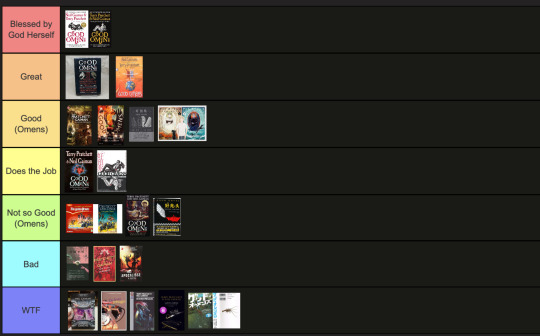
21. Labas zīmes, Latvian cover
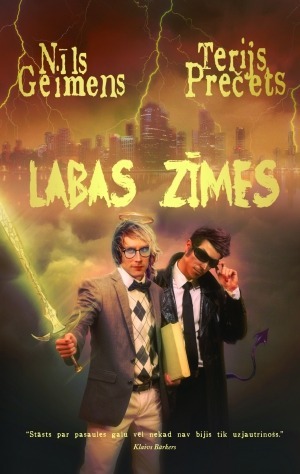
Our boys are back! And they are so ready to join the Dead Boy Detective agency. I would say that Latvians don't wear much tartan, so Argyle might seem like a similar print, but it just seems so... not Good Omens. Much like Crowley's flying purple people eater tail and Aziraphale's Conan the Barbarian sword, we're straying into niche AU fan fiction territory here. I mean, it's not *wrong*, but it certainly ain't right, either.
Tier: Does the Job
22. Bons Augùrios, Portuguese
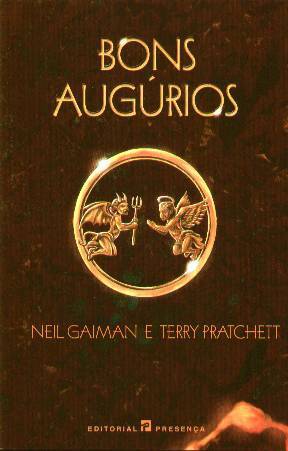
Let me start by saying this cover is so close to being in the blessed category. The layout and spacing are divine, the imagery is simple and whimsical, it reflects the humour inside the gravitas to give you an idea of the *feeling* of reading Good Omens. So few of these covers have gotten this aspect of good design right. Honestly, I would slow clap if it wasn't for that random FLAME JIZZ stuck to the bottom right hand corner of the book. Who's idea was that? Dagon's?
Tier: Great
23. Semne Bune, Romanian cover
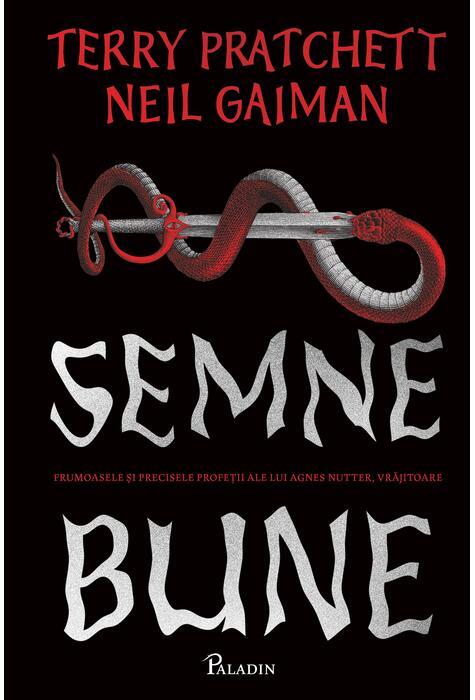
I admire two things about this cover: 1) Their utter commitment to a clean 3-colour palette and comprehensible layout. 2) Symbolic demon giving a principality head joke RIGHT ON THE FRONT COVER. This designer had balls. cotillion-sized balls. Now, does Aziraphale's sword have a sentient rooster tassel that watches said head-giving in horror? I sure hope not, but I don't see how that could be allegorical so, I'm torn. I feel like this goes in two categories for completely different reasons. And seeing as I'm in charge around here...
Tier: Great & Not so Good (Omens)
23. Semne Bune, Romanian cover cont.
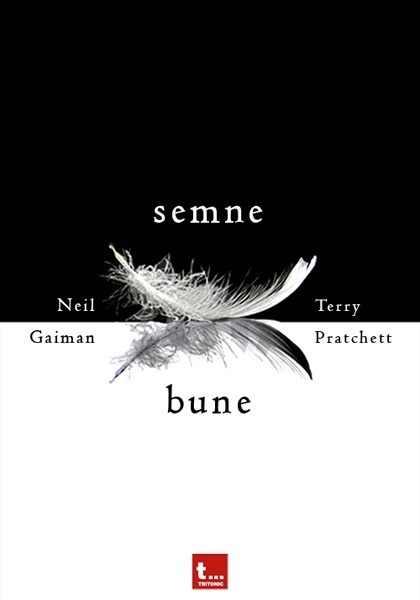
Compared to the last cover's gigantic double-entendre, this feels so tame and logical. The text is centred and balanced. There's breathing room, and we have wing symbolism! I've never seen a cover try to split Terry and Neil's names like that, which is a fun twist but BY GOD that center line is not straight near the right end of the feathers and it is sending this cover straight down to Does the Job. It's grounded there forever.
Tier: Does the Job
25. HYVIÄ ENTEITÄ, Finnish cover
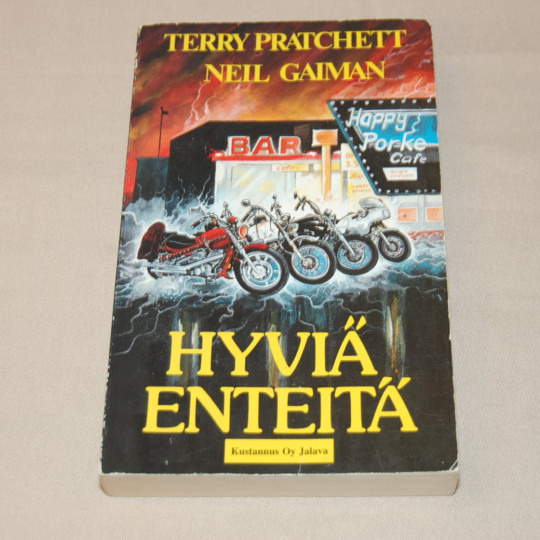
In this list, having something actually *relevant* to the main plot of the book and not mangling and main characters really puts you in rarefied air. All the motorcycles are book accurate which means somebody read something! Would I have ever picked the empty parking lot of Famine's restaurant as a subject worth a cover? Absolutely not. But the sick 80s lightning tips it into "fine" territory. The text is yellow. It's pretty.
Tier: Does the Job
26. Head ended, Estonian cover.
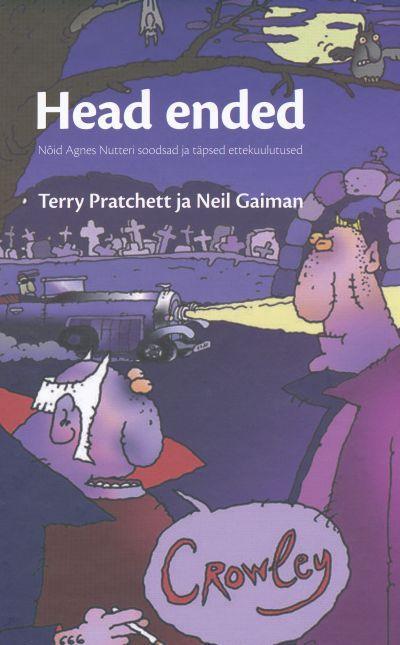
My face after staring at this cover for ten minutes and finally realizing that this is Hastur and Ligur waiting around for Crowley to pull up:
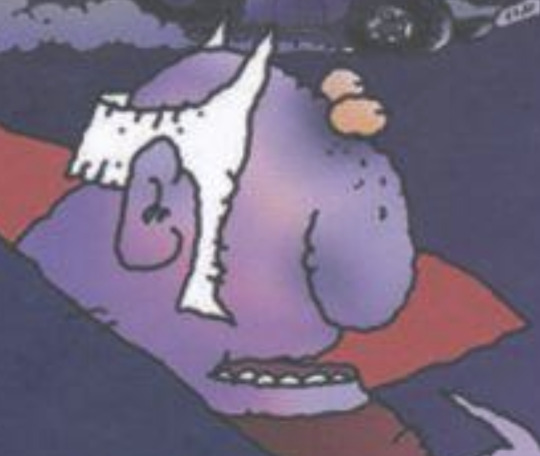
The artist's face after watching me do that:
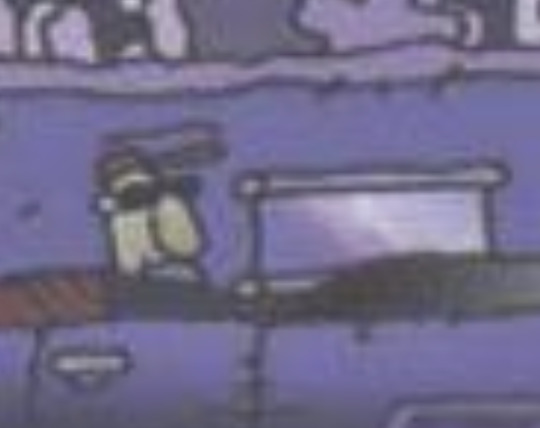
Do I even need to rate this? It's called HEAD ENDED. I don't know how to be funnier than that.
Tier: WTF
27. Dobry Omen, Polish cover
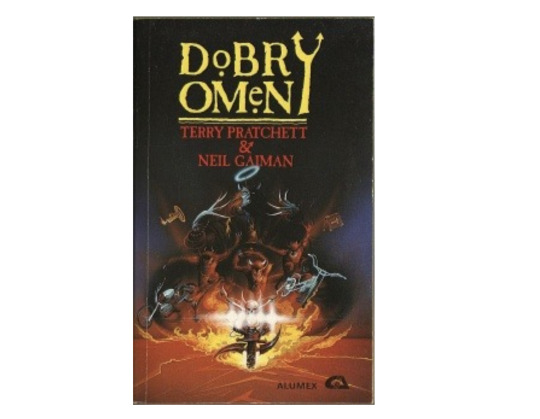
Some good points for trying to be original with the layout of the title by drawing a custom pitchfork "Y", but the heinous kerning and the fact the whole text block is not even centred kind of makes me take all the points back. I feel like we're pretty heavy on the demonic, extremely light on the angelic in this take. Maybe it's because on his death bed the lead guitarist of White Snake will finally admit to having designed this cover in his spare time.
Tier: Not so Good (Omens)
28. Good Omens, Hungarian cover
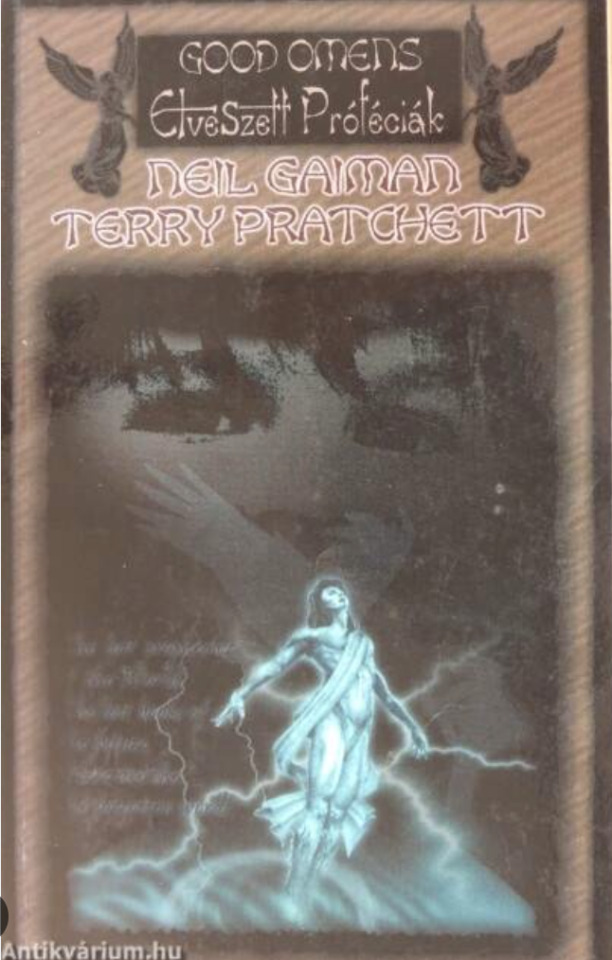
If I told you this designer did not read the book, and instead just watched the trailer of The Omen (the movie) and vibed this heinous brown carpet swatch into existence, you would one hundred percent believe me. I can't even talk about the faux belle-époque font right now. I am irrationally angry.
Tier: WTF
29. Good Omens, Bulgarian cover
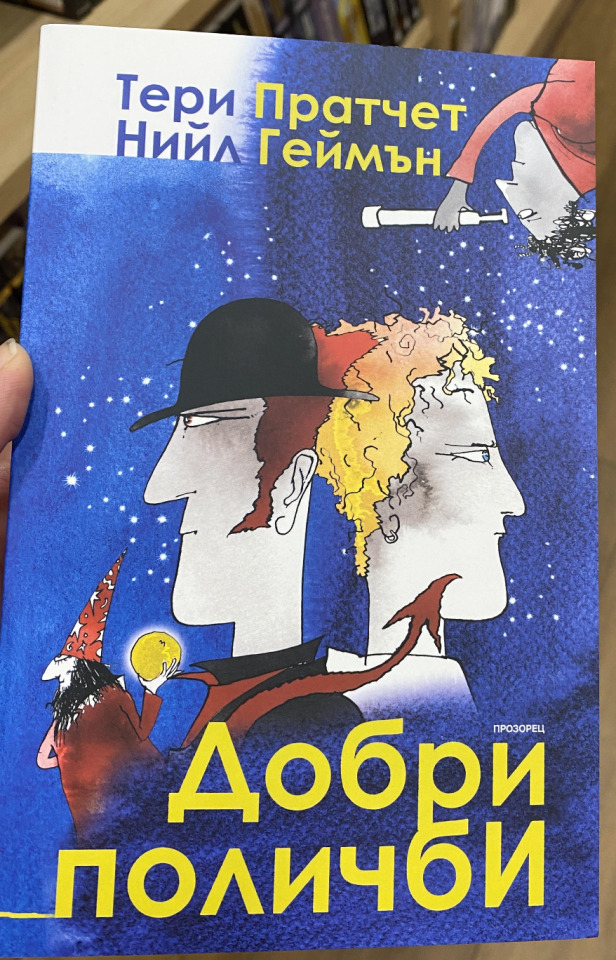
WHO. IS. DADDY. WIZARD?? Is all I can think when I look at this cover. Aziraphale & Grommet are recognizable enough, and you could make the case for telescope monkey being Adam, but I need to find this cover designer and shake them until they tell me who this deranged Gargamel is supposed to be. I must know.
Tier: Bad
30. BELAS MALDIÇÕES, Portuguese cover
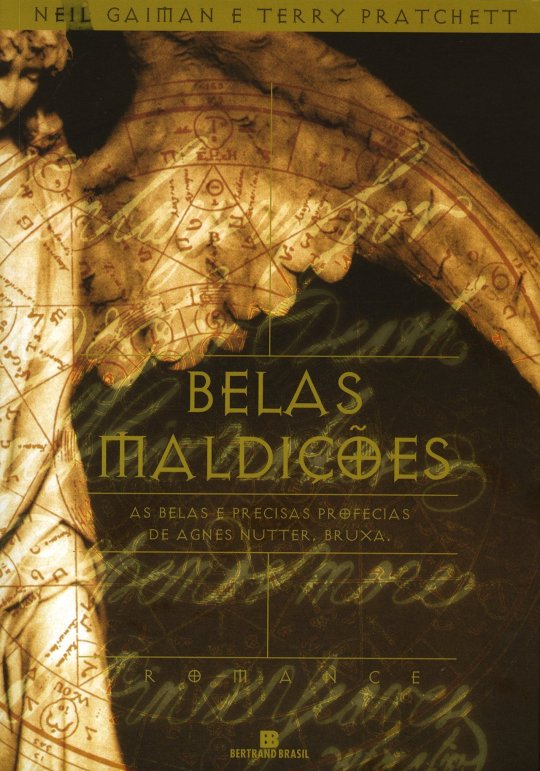
After all we've been through on this list so far, this truly sucks. It's not even weird. It's just puce text layered atop text to create a great yawn of a cover. Shout out to the designer of the Diablo PC game font, I hope you got paid.
Tier: Bad
Part 3 roundup:
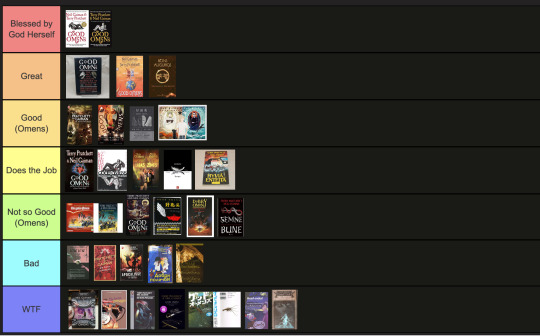
#good omens 2#art director talks good omens#go season 2#good omens#good omens fandom#tier list#good omens analysis#book cover#cover art#gomens
90 notes
·
View notes
Text
Cube Hostage Exchange Theory, for Real This Time
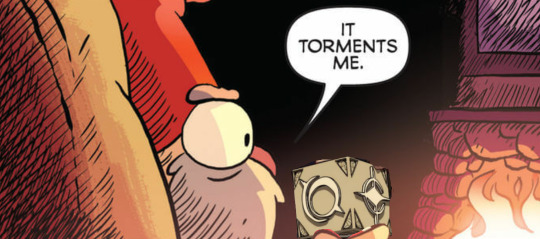
Intro
A few days after Through the Moon came out in September 2020, I made a throwaway theory post about a potential Rayllum reconciliation scenario in which Rayla would be taken captive / threatened by the antagonists, and Callum would hand over the Key of Aaravos in order to save her life.
In the almost four years since then, the theory has blossomed into much more than it started as, largely due to people's amazing art and fic inspired by it, and by the enthusiasm it's been received with, and for those things I will always be eternally, deeply grateful for.
The theory has likewise gone through many metas (some of which will be referenced and linked to here when applicable), 20+ pages alone on my blog, with surprising leaps in popularity and plausibility, and multiple variations, both within the theorizing space and within canon itself (5x08, you will always be famous).
There's also been many moments of doubt.
As much as everything seemed to make sense even as Rayllum's post-TTM reunion went on, there was still so much left that was perpetually speculative. We didn't even know if Aaravos would want his cube back, which was one of the theories' many lynchpins, and TDP loves to be subversive (within reason) and throw curveballs I never saw coming, like Terry's wonderful existence or Sol Regem's swerve to attacking Katolis. I've speculated alternative uses for the Key to high heaven (as Aaravos' missing heart piece, a key to the Star Nexus or realm, the key to his prison, and sometimes all three simultaneously as a power up he needs to free himself and wreck celestial havoc). The closest I got to was it being a literal key and related to something Aaravos would want/need back, and indeed a power up, and that he did need a quasar diamond to get out of his prison and that one was in the staff and not also in the Key. Not bad, but definitely missing some marks.
That is to say that there could still be curve balls or swerves, and a theory isn't set in stone as happening until it happens. After all, I've been fully prepared to pack the theory up and for it to not happen three times now (going into S4, particularly S5, and S6). When the S4 finale did indeed have a hostage exchange involving Rayla and Claudia and a boyfriend, I chuckled and figured we might not repeat a plot beat like that again; when 5x08 did it twice, I was overjoyed at getting the exact irony of "Callum literally frees Rayla while chaining himself further to Aaravos' will" that I'd always wanted. 5x08 was, and is, enough for me; if S7 never takes it further, I'll still be pleased as punch.
However, after four years of hemming and hawing and going into seasons preparing for curveballs... I'm pleased to say I finally don't have any doubt.
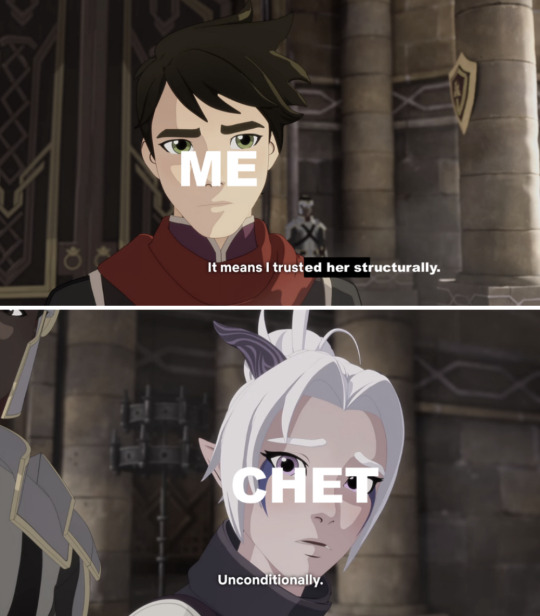
And here's why.
Sections:
Background
The Cube and the Game Motif
Neon Lights, Narrative Set Up and Pay Off (6x03, S6)
The Knowledge Motif Thread Detour
Tests of Love (Leola, Chaos, and Love)
Alternatives (no possession, third path, Rayla handing over the cube, etc)
Conclusion
Background
First, a little background. Any relevant information in the metas listed below will be summarized / explained / alluded to accordingly for your benefit, but it is a good luck at 1) how the theory has evolved over time and 2) will be drawing in relevant aspects from said metas when discussing season 6.
Previous proper CHET metas include (in chronological order):
The Original Theory Post / Meta (Oct 2020, post-TTM)
Rayllum and Rayla's Weird Consistency with the Key (March 2022, pre-S4)
Rayla's Duality as Callum's Salvation and Destruction (Aug 2022, pre-S4)
CHET: End of Days (Nov 2022, pre-S4)
Opposing Cube Symbolism in 2x08 (Dec 2022, post-S4)
Here's How It Can Still Win (Dec 2022, post-S4)
Aaravos and Rayla as Callum's Two Paths (May 2023, pre-S5)
Shorter post-S6 meta
Things that are useful to our meta here ultimately, however, with a couple of S6 updates in later sections are
THE GAME MOTIF
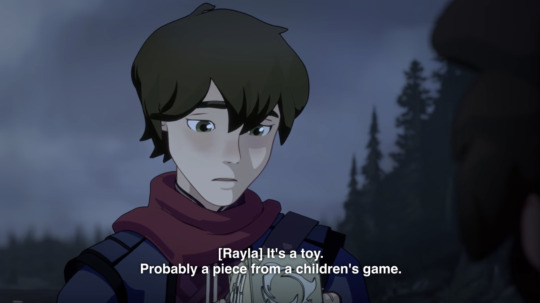
This refers to a repeated visual and verbal literal and metaphorical motif running throughout the series. Although not exclusive to him, 90% of the time the Game Motif is in relation to Aaravos. It is most prominent when discussing the Key of Aaravos in arc 1 ("This is the game room. Cube should be in there" / "It's a glow toy" literally / "Are you practicing magic or are you losing to Bait at a game of rolly-cubes?") with one 'throwaway' line from Viren to Aaravos in 2x08: "What game are you playing at?"
This then took on a much more prominent focus in arc 2 thanks to the pawn intros and lines from various characters, such as Zubeia's assessment that "We had to beat Aaravos at his own game," Viren's reservations that "I believe Aaravos may be toying with us," Ezran's "His pawns are working to free him even as we speak."
Much of this has been rather set in stone for a while now (one of the TDP's shorts did, though, excitingly link Aaravos' test of love to the game motif, with the line "They aren’t games. They’re tests") but S6 did add some very exciting overlap with Aaravos' game and dark magic, which is fitting given that the two are deeply intertwined: "Because you're too good for dark magic, now? You had a lifetime to play with your toys, and now you decide to hide them away and destroy them?" (Viren to Kpp'Ar about the staff, 6x06.)
We also see occasional overlap with this motif and the stage motif ("You've played your part well" in 6x08 to Sol Regem / "Aaravos chose as his instruments..." + "You will perform acts of love so unforgivable..." in 4x04) as you can play a game, and play your role in a theatrical performance. Or in Callum's case, as a puppet who is "destined to play right into" Aaravos' hands.
PRIMAL STONE FORESHADOWING
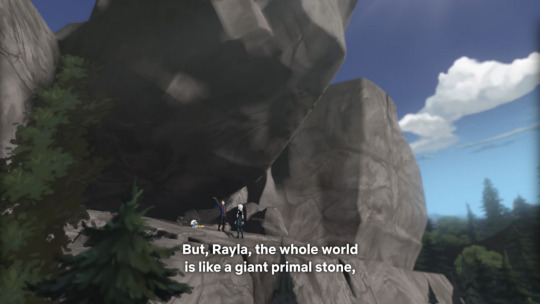
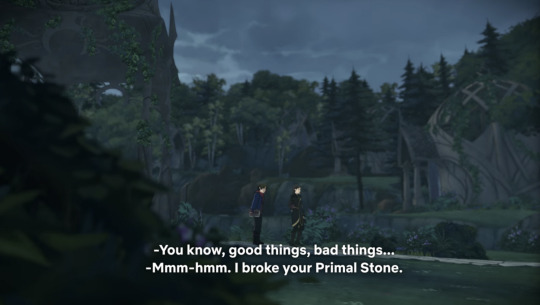
As Callum discusses in 2x02 directly, he broke Claudia's stolen primal stone on purpose (not by accident) because he had "a good reason". The comparison later on in the same season, then, that the whole world is like a giant primal stone, and Callum's tendency towards breaking things (specifically magical objects) we well as the emphasis on "breaking the cycle" therefore felt like setup. It also felt particularly apt given Aaravos' wish expressed in Patience that:
I have not seen the stars in centuries. But when I see them again—when the stars are forced to look upon me, their dark brother—they will know how I have waited. And when everything they have built lies shattered, I will savor their fall from the sky.
S6 also affirmed this by associating the primal magic that Leola 'gave' to humans the "first step in a long spiral towards Callum," and what that might mean for Callum, someone who is uniquely a primal mage and has used dark magic. The fact that Aaravos and his key (remember that game motif) are associated with the book of / primal magic as well as dark magic reinforces this duality further.
Who better to shatter the Cosmic Order and known world for the worst better than the boy who is already shattering it for the best?
LIGHT AND DARKNESS
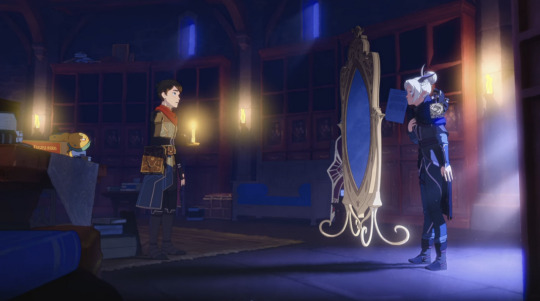
The cube and Aaravos are associated with both light and dark, not only in design, but in magic systems. Aaravos and dark magic are routinely related to darkness ("because I have followed a dark path" / "the darkness and corruption will overwhelm you" / "and my favourite, the human mage, already tainted by darkness" / "in darkness, gaze upon a fallen star"). This is fairly straightforward, as Rayla represents literal light (which we'll get to in S6 in a moment) that heals Callum's broken spirit and rescinds Aaravos' control over him. Note, for example, the way she's shrouded in light in clear opposition to Aaravos' mirror right next to her, with Callum facing ahead towards both of them.
However, it's not that simple, because light can also be seen as a bad thing, such as the possession eyes, Karim's desire to "return the light/sun" to his people, the cube-moon opal's light on the Bridge of Darkness in 4x07 leading to danger, dark magic turning your hair white, and most notably, the way the pawn becomes a literal glow toy in the 4x04 / 5x08 pawn intro.
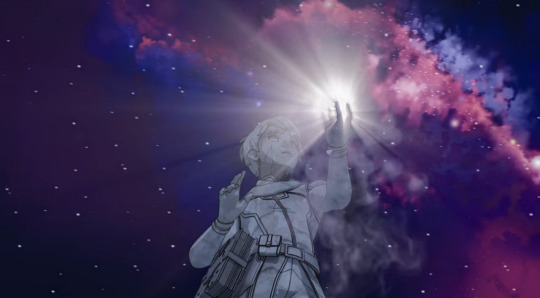
The light of the cube — perhaps the light in general — is not going to be exclusive in playing into Aaravos' hands. In the mirror-Rayla screenshot, for example, the path towards Rayla is embodied by the shadow she casts on the floor (similar to how regularly Claudia is portrayed in Viren's shadow in S6).
And, speaking of light...
RAYLA AS CALLUM'S PATH, SINGULAR
As speculated pre-S4, Rayla represents light, truth, and love in Callum's life. This was then canonized in 6x06. Post-S4, it seemed overtly evident that Rayla was being set up further to represent a path in opposition to Aaravos. She would save Callum from being Aaravos' prey, she was the Light and reminder of agency to Aaravos' Darkness and stripping of agency. "What if I'm on a path of darkness?" "Then take another path, dummy." This was, of course, all in line with the previous light-darkness and game motif described above. Rayla couldn't, and won't, kill Callum permanently after all if at all, so she has to save him instead.
However, it was also pretty clear following S4 and especially S5 that the razor's edge between salvation and destruction, as embodied by Rayla being the reason he was in Aaravos' clutches in the first place (getting him the cube, being his motivation behind doing dark magic), would eventually merge. Her love would ultimately save him, but it would destroy him first.
This has, of course, been their pattern throughout the series: Rayla comes into his life, causing him to turn/destroy his relationship with Claudia and put him in danger, but she's also what pushes him to do magic for the first time; he follows her off the Pinnacle at great risk to himself, but his love for her helps centre him enough that he can save them both; she is the reason he does dark magic (twice), but is also what fixes his broken spirit during the star-light trial ritual.
Because she's not just the other path in opposition to Aaravos. She is his path, singular.
If you're interested in more of this, I'd recommend my one about the layers of Rayla being Callum's One Truth in greater detail, as well as general speculation of their arc in S7, some of which will be referenced/summarized here as well.
With all that out of the way, let's get into it
The Cube and the Game Motif
Anyone who knows me knows that the Game Motif is my favourite motif in TDP (which is saying something) and that said motif has been a long standing cornerstone of CHET. This is mostly because, as noted, in arc 1 the Game Motif existed almost exclusively with the cube down to its introduction.
CALLUM: This is the game room. Cube should be in there. (1x04)
CALLUM: Last night you thought the cube was just a worthless toy. But now we know— RAYLA: It's a glow toy. (1x05)
The Game Motif was also associated with Aaravos sparsely in arc 1 ("What game are you playing?" Viren demands in 2x08, and never receives the answer / "Well played. She will be a valuable asset") and magic itself ("Is this a guessing game? Just do it!") although to a lesser degree. There were also nods to the imbalance of power in Xadia, with Harrow noting, "Entire armies have crumbled and fallen like toys before [Avizandum]. How can we hope to kill such a godly creature?"
Then, as noted in arc 2, the game motif went from being associated just with the cube to being associated with Aaravos outright, both verbally through dialogue and literally in the pawn intros. This is what I call a motif expansion, where something moves from subtext to text. It is somewhat similar to a merger, where two previously separate associations are brought into being one in the same. This is initially how the cube operates, since the game motif is ongoing whereas Callum's statement of "You wait here, however long it takes, I'll go find a key" in 1x04 is only made foreshadowing in 2x06 when he learns it's called the Key of Aaravos.
2x07 takes this further, though, with this dialogue exchange:
CALLUM: [Holding the cube] What do you think this thing is, anyway? He said it was a key, but a key to what? RAYLA: Are you practicing magic, or are you losing to Bait at a game of rolly-cubes?
For example, here we see the Key analogue/association and the game motif be linked together. TDP does this a few more times with Aaravos' key becoming associated with light (4x04/5x08), destiny dark magic (2x08, 4x04), secrets/mysteries (2x07, 2x06) and more. A lot of this is, of course, because Aaravos is likewise associated with all these things, and the Key is tethered to him and his plot line / motifs and associations.
The game motif does exist outside of the cube's associations — Ezran's pattern of hide and seek represents his childhood innocence, his tendency to run and hide when things get hard, and him shedding both these patterns as they attempt to find
The most interesting thing that S6 did on this note, then, was make the game motif associated not just with magic, but very specifically with dark magic:
VIREN: Because you're too good for dark magic now? You had a lifetime to play with your toys, and now you decide to hide them all away or destroy them? (6x06)
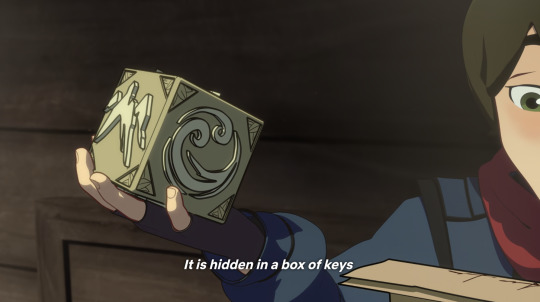
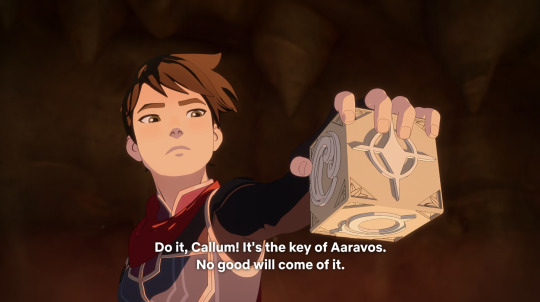
Why am I screaming about this, you may ask? Well, the Staff of Ziard is about as synonymous with dark magic as a thing can get in TDP. It too belonged originally to Aaravos, and became a cornerstone in his grand plan, at least of getting out of the prison.
HARROW: It belonged to an elven wizard in Xadia, the Archmage Aaravos, a master of all six primal sources. (2x06) IBIS: If you seek to return that staff to its true owner, you pose a greater danger to the world than I can allow. (4x03)
So the Staff is a toy, and dark magic, and belonged to Aaravos, and used in his plans, brought directly to him by Viren (indirectly) and Claudia (directly). And the Key is also referred to as a toy, is also in the possession of another pawn, and has also been hidden and/or 'should' be destroyed. A knowledge of primal magic, at least in terms of how it manifests in creatures/locations, is also required in order to be a successful dark mage.
So not only is Aaravos and the key tied directly to the game motif, but through Viren's exchange with Kpp'Ar, so is dark magic. In many ways, this takes what was subtext — dark magic is what allows Aaravos to puppet and manipulate people such as his pawns, and keep the Cycle (his game) going, even if he's not what directly started it (that was the Cosmic Order/Council) — and makes it text. Aaravos' toys are toys ultimately because of their tethers to magic, typically dark magic as well, and his objects of choice, such as the Staff or the Key or how he puppets his pawns, are not exceptions. (There's potential for primal magic as well, of course, but it's currently not as direct).
We also know, thanks to Arc 2, that the Key and Staff are more similar to one another than we might've thought in terms of their purposes in Aaravos' plan. I'd speculated in the past that the Staff and/or the Key held quasar diamonds that Aaravos needed for some power-up purpose; the Staff had the diamond needed for his body contingency plan, and the Key is needed for his primal book to operate and presumably be found, so that he can be at full power.
Furthermore, we have a pattern of dialogue about the Key / game motif eventually becoming literal. The cube is called a glow toy, and then in the pawn intro is revealed to be a literal glow toy; Callum says "what if it's magic?" in 1x04 and we discover that it opens up a book of all primal magic; it's foreshadowed loosely as a key, and it is a key; Rayla asks if Callum is losing a game, and he's embroiled in Aaravos' game as a pawn. Callum will win eventually, of course, as will everyone else... but he has to lose, really lose, first.
After all, every other line regarding the cube has come to fruition other than three:
"This is the game room. The cube should be in there" and "I'll go find a key" from 1x04 have both come back around. "It's a glow toy" from 1x05 ended up being true as well, with the cube flashing a bright light in Callum's pawn intro (and even the cube being included in the pawn intro). The Key's secrets are things Callum is currently investigating (6x02) and will likely fully discover in S7, possibly leading him to Aaravos' book or something else near Elarion and the thematic culmination of the Mystery of Aaravos. Callum's notice that the key seems to be glowing differently in 1x09 is revealed to be true because of the Moon Nexus. Rayla's line in 2x07 about losing the game to Bait is true in 5x08 as he practices magic (both dark and primal) in order to save her from being literal bait, even if that means taking a step closer to Aaravos and 'losing' the game. I expect Callum's assessment of "No good can come from it" (4x07) will ultimately be untrue if it helps him study primal magic ("What if it's magic? [...] I just have a feeling this cube thing can help me"), and Rayla's decision of "Let's go get your cube" is likely going to be true by the end of S7, with Callum reclaiming ownership completely this time.
So let's talk about the three lines that haven't come to fruition yet, because they paint a pretty apt picture:
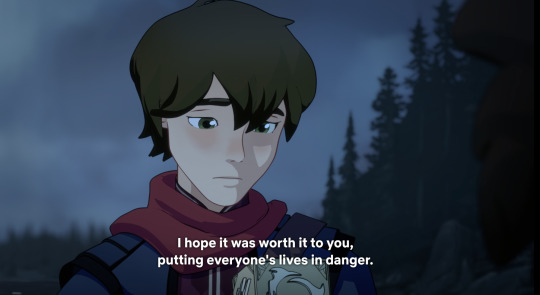
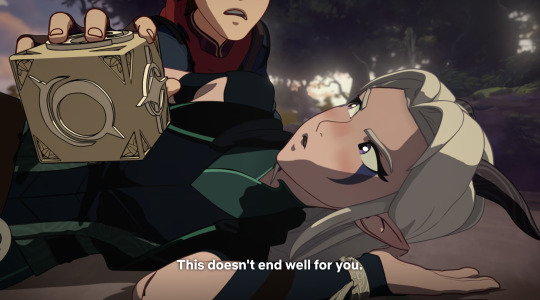
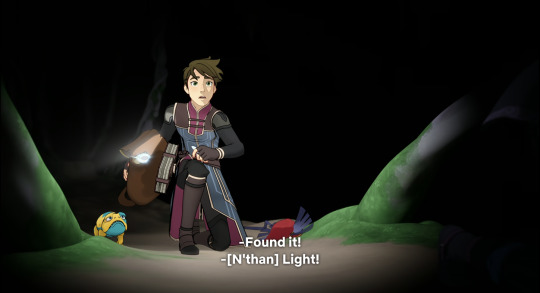
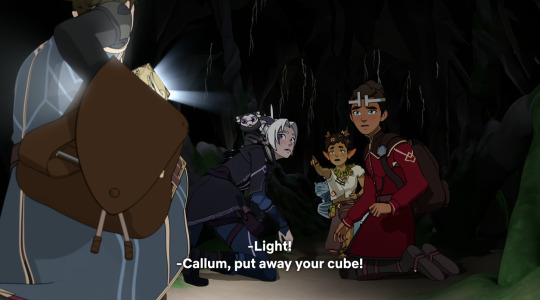
So in the biggest notion of currently untapped set up, Rayla after being the first to declaring the damn cube a toy says "I hope it was worth it to you putting everyone's lives in danger." The thing is that this it's not like this line doesn't work in context, it very well does; someone could've gotten hurt and Rayla was nearly killed. This is also a sort spot for her because she'd just done the same thing in 1x01, putting her troupe in danger, so of course she's extra (somewhat fairly, somewhat unfairly) miffed at new mage boy repeating her mistakes as well.
Games (and chess) are all about patience, exchange, and sacrifice. We know now that the cube is something powerful, why it is, what it unlocks, and why Aaravos has the incentive to want it back (which as stated was an assumption before).
But the fact remains that the game motif has been tied to the cube to the start and continues to be. Callum's test of either playing into Aaravos' hands and coming back from it (the option that I lean towards) or outright rejecting it again cannot be fulfilled until the cube pawn intro has come full circle.
So let's talk about
Neon Lights, Narrative Set Up and Pay Off (6x03, S6)
As you can garner from this meta and any of my previous ones that have touched on this theory, there were a lot of assumptions that had to go into it. I had to assume, prior to season six, that Aaravos would even want the cue back. I had to assume, prior to season four, that the Rayla-Aaravos Callum-Viren foils thing was happening on purpose and that Rayla would be put in opposition to Aaravos as the light to his darkness. I had to assume, prior to season five, that S4's emphasis on people doing terrible/misguided things for love through characters like Rayla, Terry, Viren, and Claudia would eventually become a mainstay in Callum's arc 2 character arc.
I had to assume, prior to season six, that the story would eventually be inclined to put Callum in a scenario where he'd have to choose between Rayla and the greater good so directly. After all, while I was confident post-season 2 onwards that, if put in a situation with Rayla and/or Ezran's life on the line, Callum would always do dark magic, that was ultimately a characterization basis. Yeah, I could think that he would go there, but the story was under no condition to go there from a Plot standpoint, ie. assembling the story and plot line so that Callum would be faced with that kind of choice again. They could choose to not explore that aspect of a potential character arc, leaving it technically unknown. My characterization predictions in these scenarios, then, have been routinely consistent, but whether the plot itself would cooperate was entirely up in the air, with some plot evidence existing due to TDP's love of exchanges, trolley problems, and hard choices.
Then 6x03 happened:
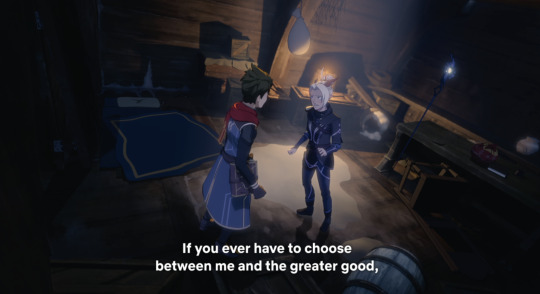
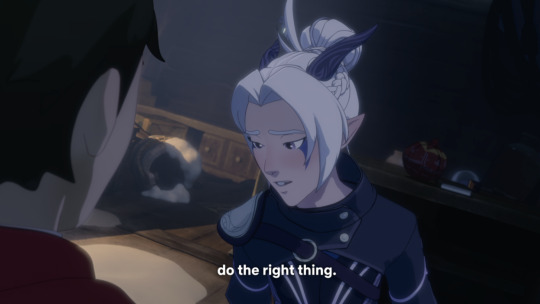
To say that I cried/cheered would be an understatement.
This, of course, doesn't necessarily mean that Callum will do what I think he'll do, or that it'll play out in the manner I'm imagining. It does seem blatantly obvious, however, that S7 with the season's synopsis emphasis on sacrifice that both Callum and Rayla will face the choice of whether to sacrifice the other, one after each other: Callum first — as he must do dark magic again in order to be possessed — and then Rayla, tested and finally choosing not to sacrifice something to her, saving him back as a result.
But furthermore, I lost my fucking mind explicitly because it's not just a question of "will you sacrifice me or yourself" (which we know isn't a real question for either of them) but "will you sacrifice me or the world (greater good)" which is exactly what I've wanted for both of them all along. For Callum to put Rayla first the way that he always has, and for Rayla to (subsequently) put Callum first as a sign of growth/character development. (This also ties into Rayla's whole thing in s6 of taking the lessons Callum's taught her about how to love and implementing them with him in turn or with others, but that's a meta for another day.)
Now, there are alternatives that there could be / ways to get around the 'greater good' slice of the pie, which I'll talk about later under the Alternatives subheading.
For now, I just want to assert the narrative set up and potential we have so far in a plainer way:
The Knowledge Detour
We know that Aaravos wants the cube (6x09) and we know he knows that Callum has it (4x04, 5x08).
The game motif and key motif have been directly related to dark magic (2x07, 2x08, 4x04 "play right into my hands," 5x08, 6x06, etc).
The Key itself is also related to secrets (2x06), the secrets of primal magic (2x01), and thereby knowledge / answers to the 'Mystery' of Aaravos.
This is also related to the idea of knowing too much or having too much knowledge being dangerous (which you can read more about here, although it's pre-S6 so it doesn't touch on everything presently that it could have).
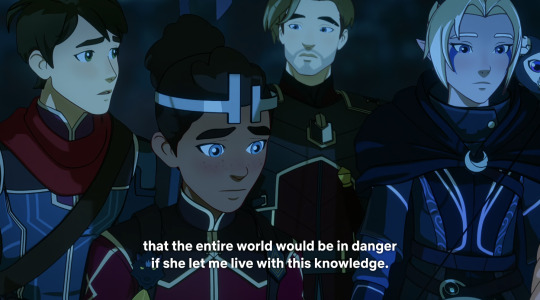
After speaking with Rayla, Callum tries and fails to give up the cube to assert his own destiny / that 'destiny is a book you write yourself' (4x07)
Callum, like Rayla, will be forced to make a choice between the greater good and his loved one. He will choose her even if that means sacrificing himself on top of the world, and she will save him (symbolically refusing to sacrifice herself).
[Gestures to the rest of the cube / key foreshadowing]
I also want to talk a little bit more about mystery. I touched on it here in a previous meta (Rayllum's potential S7 arc through the lens of S6), but there's an emphasis in S6 on mysteries versus love, with love winning.
I would tell you that the vast mystery I travelled the world to find was contained in you all along. (6x03)
Those few short years with Leola were the most meaningful. Pondering the deepest mysteries of the universe could not hold a candle. (6x09)
Both of these sentiments are similar and apply to Rayla and Aaravos directly: she wanted the security of knowing Viren was dead only to return home to the one thing she wanted ("the best thing I ever had: you"). Likewise, Aaravos had the best and most meaningful years of his eternally long existence when he was with his daughter, where his study and pursuit of magic / universal mysteries ultimately paled in comparison. While it is ordinary parent behaviour as well, Aaravos being away from Leola because of his key and book upon the moment she's taken has layers, as well as how he torments Sol Regem specifically with a mystery concerning love:
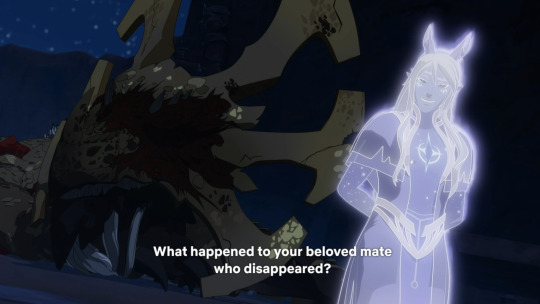
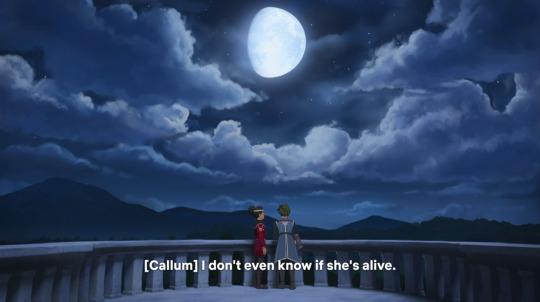
We see 4x01 establish two mysteries for Callum that run throughout the rest of the arc thus far. The first is the mirror ("What secrets are you hiding?") which is a stand-in for Aaravos, and then Rayla, even once she returns ("I don't know how to feel about Rayla, either").
These threads run in parallel throughout S5 and S6 (Rayla specific one only here). In season 5, Rayla kicks off both Callum's desire to discover how to kill Aaravos (5x01-5x05) and his new understanding of himself in the Ocean arcanum through their relationship (5x01, 5x04, 5x08). In many ways, S5 is him realizing that he will always be there for her, no matter what the cost — even if that means taking a step closer and making himself more vulnerable to Aaravos.
In season 6, Callum is grappling over the Starscraper / Nova Blade as well as worries of how Rayla will respond to his dark magic use. He worries that Aaravos will use him: "I don't know how, but I'm afraid he... he's gonna use me." The mystery he does solve within the season, then, is suitably what is his one truth — what does he know, without a shadow of a doubt, beyond and above anything else? If S5 is Callum realizing he will always be there for her regardless of anything that's happened or could happen, then S6 is him realizing that Rayla will always be with him (regardless of whether she's physically there or not) and will come back to him.
The reason I'm tangentially emphasizing this is because Callum is a knowledge seeker, inherently — he wants to learn magic and he wants to use magic, and that has always been one of his greatest strengths and weaknesses (ie. going out into the Storm, being unable to throw the Key away). The Mystery of Aaravos through figuring out the Key's secrets will be just about undeniably important, and while Callum might not get obsessive about solving it, the Key still represents that curiosity and desire to Know—the mystery he's chasing and has continued to chase about the world. Knowledge or love (giving up magic to save Zym and Rayla by proxy), and on occasion ("How did you—?" "Cause I love you, Rayla" / "To love is simply to know this") both at the same time, just as Rayla's arc has routinely centred on the push and pull and occasional reconciliation of love and duty.
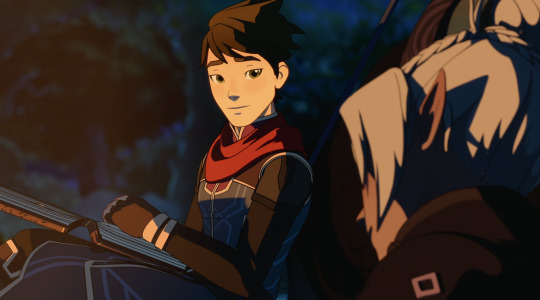
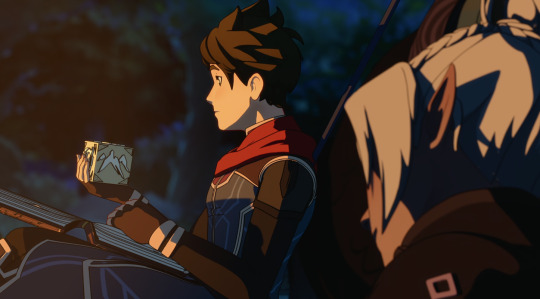
Rayla's advice in 4x07 made him nearly throw the Cube away, or give up that Knowledge seeking quest. This doesn't mean that Callum should give it up entirely (I've said this in many places, but I think by the end of S7 Callum will likely have the Key and Book as his own rather than Aaravos', paralleling his reclamation of himself and his identity) but the current framing of 4x07 begs the question of "What would you give it up for?" What would you sacrifice this knowledge or curiosity for? Because we know, typically, curiosity and the pursuit of knowledge isn't enough for Callum; he won't "risk his life for magic" (2x04) and views that as being an idiot, but he'll launch himself off the Pinnacle. He'll do things for love that he won't do for magic; he'll be motivated to find knowledge and walk down those paths because of love. Just curiosity, typically, hasn't been enough.
Speaking of which, let's talk about
Tests of Love (Leola, Chaos, and Love)
The game motif and its connection to other aspects of the series—the stage motif (Aaravos and Callum's bowing / "destined to play right into my hands"), dark magic ("You had a lifetime to play with your toys and now you hide them all away or destroy them" / "I'm afraid Aaravos is toying with us")—and indeed the concept of tests ("We all want peace and we all want love, but violence tests us" / "They aren't games, they're tests") had always felt conducive to Aaravos' character, thanks to his statement in 2x09:
You tried to win over the other humans with loyalty and friendship, but they ignored you. Those who fail tests of love are simple animals. They deserve to be motivated by fear.
Even before S6 aired, this statement already made sense—while Viren was motivated by his quest for power and importance, and that was what Aaravos seemingly preyed on, when at the core of it was Viren's desire to be loved and to matter:
I am having some trouble getting people to listen to me. To hear the importance of what I am saying. [Who are these people?] They are kings and queens, the other leaders of the Pentarchy. (2x09)
[To Harrow] What? No, that's not what I'm saying. Please, listen— (1x03)
It is everything to me, to know that I mean something to you. To know that I matter. It's all I ever wanted. (5x02)
Aaravos was able to give them something they wanted very badly. (4x04) / Search your heart. There is something you want very badly. (2x09)
Aaravos' entire manipulation of Claudia has also been based around love—encouraging Viren to lie to her so she wouldn't break away from him and subsequently preying on her desire to keep her family together, dangling Viren's life like a carrot in front of her for two years, pushing her relentlessly on a 30 day limit, and then telling the tale of his daughter to help her perform a spell (the same spell that Callum is doing miles away) literally out of love by letting her connect it to her father.
We see where this mindset came from, of course, in S6, with Aaravos bargaining for Leola's life on the basis of love/compassion, and then to die in her place, both of which being refused. The Cosmic Council failed his test of love, and now he's out for revenge no matter the cost, as Terry says:
Maybe this started out as a story of love, but along the way, it got twisted. He isn't doing anything out of love. He's doing it for revenge.
We also know that the parallels Rayla already has to Leola are just going to be continued into S6 further.
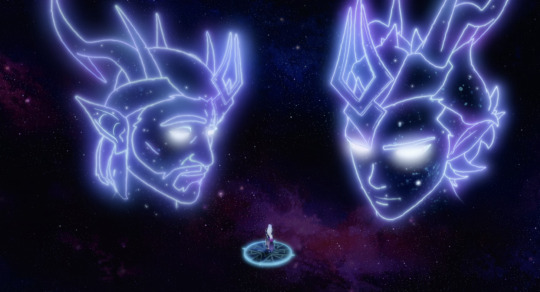
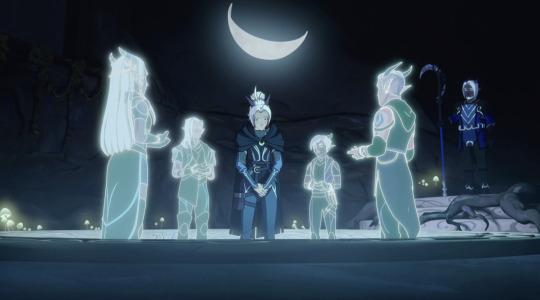
We also know thanks to S6 that the Cosmic Council considered humans having primal magic to be "the first step in the long, slow spiral to chaos." Callum then having multiple arcanums and presumably one day going to continue to spread primal magic to more humans is definitely something they're going to be apprehensive about. Callum reclaiming the Key and Aaravos' book alongside his own identity/agency would make a lot of sense, but that reclamation is only really possible if those things were stripped away to begin with... and it's likely only one thing could strip away those things from him: the lengths he's willing to go through for love, and how love can also bring him back (much the same way Claudia's love for her family doomed her, and will ultimately likely save her).
Callum, you're the 'Destiny is a book you write yourself' guy. No one can control you or make your choices for you. (4x07)
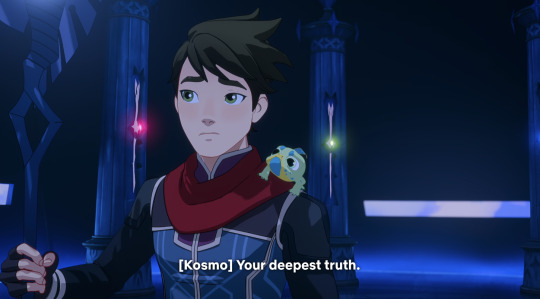
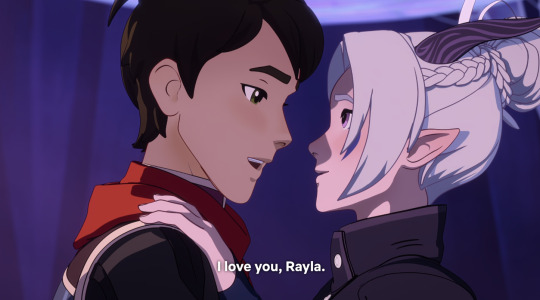
See? So long as we protect each other, so long as we love each other, you can never control us. (5x08)
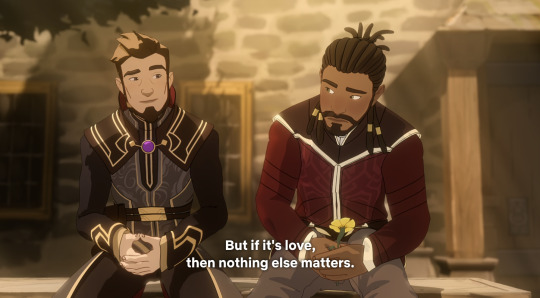
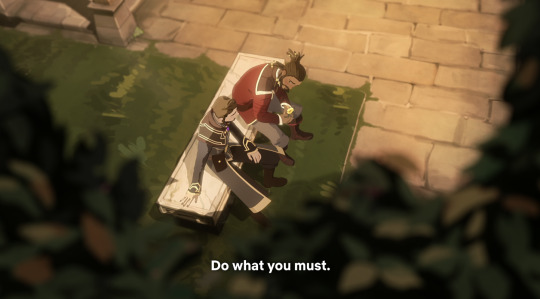
To love is simply to know this: the tides are true as the ocean is deep. (5x01, 5x08)
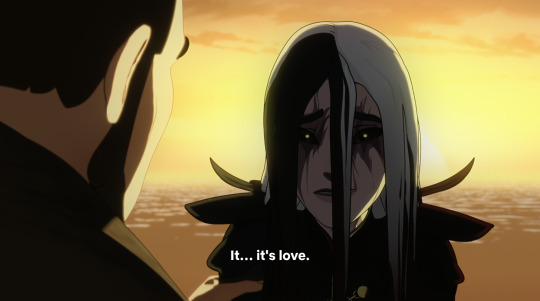
Love can save and destroy us, much like how Rayla is the reason Callum took (and may take again) a path of darkness and also lead him back to light (hopefully with help from Ezran). No matter how corrupted or broken, no matter what you've done before, you can be saved and can fix things and at the very least make amends.
Furthermore, if killing Leola for her mercy was what broke Xadia, saving Rayla (and her mercy) will be thematically what helps fix/save it—and also means she can save Callum afterwards, too, since he's the Hope of Xadia and changing the magical scales.
With this basis in mind, let's look at:
Alternatives
For the sake of posterity, the exact events I'm laying out in the above theory is something that looks a little like this:
Rayla is injured and/or dead / on the verge of death somehow
Aaravos (or Claudia) promises Callum can save her if he hands over the Cube
Callum does so and in turn receives the dark magic knowledge he needs to save her
He does the dark magic, and Rayla is saved
Callum is corrupted / possessed and leaves with Aaravos
This lets Ezran and Rayla come together to get him back and resolve any loose ends from their Big Different Feelings about Runaan from earlier in the season
Although Callum did play into Aaravos' hands, he will break free and live beyond Aaravos' perceived use for him, and help defeat him
Now let's talk about alternatives:
Callum doesn't get possessed
This is the only one I'm gonna rule out directly, as I don't think it's likely given the amount of set up and that S7 is Book 7: Dark. You wouldn't have Callum bring up the promise either in 4x07 or again in 6x03 if you didn't want Rayla to be faced with that choice, so he has to get possessed. That at least means a major risk of playing into Aaravos' hands, even if those plans aren't taken to fruition.
Callum gets possessed but not through dark magic use
I've seen positing that Callum could get tainted by dark magic again if he was exposed to the Lux Aurea corruption from a creature or something. I'll also toss one in, which is that perhaps you could be hit with a spell of dark magic of some kind, and have it seep into you—if not from Claudia then maybe Aaravos. Both of these options would fit to me if Callum was pushing someone (Ezran, Rayla) out of the way as that still provides an active choice. It just being happenstance because the characters were randomly attacked in a dangerous area doesn't sit right with me and the show's emphasis on choices and agency even when it would be possible and easier for characters to be more blameless, so I think there will be something along a choice rather than it just being entirely random / Callum's agency being entirely removed. Otherwise, we'd be back entirely to where we were in S4/S5 where he was tainted and open to possession no matter what through no real fault of his own (prior to 5x08); S6 giving him a clean slate also gives him agency about whether he's corrupted or not, and I think it'd be less effective if that agency wasn't utilized.
Aaravos doesn't get the cube
While nothing but canon itself (as it could pleasantly surprise me, and I'd reassess) could change my mind regarding "if Ez or Rayla were on the line, Callum would give Aaravos the key/whatever he wanted to save them" from a characterization basis, that doesn't necessarily mean the plot is going there. For example, I could see Callum just taking the dark magic deal, and then the race is on for Rayla to try and stop a corrupted Callum from delivering the cube to Aaravos. It'd have high stakes, he'd still have some faith that he could make his choice without dooming everyone because she's there to be his safety net, and it'd bring the "I hope it was worth it to you putting everyone's lives in danger" about the cube back but on Rayla's end, as she was the speaker and Callum is worth it.
Rayla gives Aaravos the Cube
I'll admit a set up scenario for this leaves me scratching my head a bit—would Callum be possessed, but Rayla had the cube for safekeeping, and she hands it over so Aaravos would release him? which isn't too dissimilar from some of the central scenario of what I've proposed—as well as it taking away from 1) Callum's agency in breaking free from possession, ironically, and 2) the Cube being his item, not hers. That said, I do expect Rayla to choose Callum over just about everything this season (including possibly the surefire safety of the world) and for the season to do the legwork to get her there from a character development standpoint, so it's not out of the question. It just currently seems unlikely.
Callum doesn't pick between Rayla or the greater good, and has a third path instead
This one is interesting to me, mostly because I'm not sure how it'd fit into the season pacing wise. As stated, I think Callum has to get possessed in the season, as that plotline has too much buildup to get dropped. I suppose that could mean something like 1) he's corrupted through other means (see bullet point number two), 2) Rayla + Ezran saves him from possession, and 3) afterwards, he's presented with a choice between her and the greater good? That could take us to the finale where he's able to find a way through Aaravos' machinations to avoid making that choice, but it does mean until that moment Callum has had little to no agency (and therefore little to no character development) in our final season of the arc. That could reflect the possession plotline's lack of agency, even if it doesn't feel quite congruent with S6 handing Callum back his full agency, but... shrug emoji?
To me, the clearest third path between not sacrificing Rayla or the greater good would be "Callum sacrifices himself in order to take down Aaravos" which could mean unlocking a super dangerous arcanum he might not come back from (Stars would probably fit best there, but Sun or Moon too?) OR doing dark magic to defeat Aaravos; the latter in particular would be a strong Viren parallel to 6x08. We would get the self sacrifice and corruption slant, but it would be without the actual possession part, even if his corrupted form would be undeniably dangerous. It would mean that Rayla is saving him without risking much else, though, which lessens the impact of her arc. This first arcanum avenue would work for a finale, with the dark magic avenue being reserved for mid season (7x04 to 7x07) as a possibility.
If there any alternative theories or ideas you've seen or have that I haven't addressed here, feel free to send them in or leave them in reblogs/replies (I definitely could've missed one, or misrepresented one)—so long as you're earnestly presenting one, and not just wanting to see it debunked because you think it's stupid and/or that people who like it are silly or foolish.
Conclusion
So, in conclusion, CHET as fully and currently posited:
Explains hy the cube is in Callum's pawn intro
Furthers set up with the cube and game motif (+ others) throughout the show
Explains he'll be corrupted and how the possession plotline will come into play
Deepens the series' theme of exchange (i.e. bringing Zym home in return for peace) and transaction (dark magic)
Culminates the setup from 4x07, 5x08, 6x03, and 6x06 in particular
Reaffirms Callum's struggle with losing his sense of self amid dark magic use and Aaravos' hold on him with literally losing himself
Allows Callum to reclaim the cube alongside his own identity once he has broken free
Develops his relationship with Rayla, as well as Rayla and Ezran's dynamic
Culminates Callum's arc in exploring Arc 2 (and the series') main theme of "love can destroy you, yes, but it can also save you" / arc 2's focus on reconciling dualities, as discussed
And I think that's about it!
If you made it through all of this—or indeed have enjoyed this pet theory for any of the 4+ years it's existed—thank you for reading and engaging with it! It was crazy to me after S5 and especially S6 that it was still on the table rather than being decidedly demolished, and I'm excited to see parts / pieces likely come to fruition in S7!
#rayllum#cube hostage exchange theory#tdp meta#tdp#the dragon prince#analysis series#analysis#aka yes i am clearing out / cleaning up my drafts rn
69 notes
·
View notes
Text
Dragon Prince S6 Thoughts
"Sometimes the line between mercy and cruelty can be thin." Aaravos and Startouch Elves

Well holy shit, that opening really went from wholesome Viren (who is alive) hugging Terry and celebrating Aaravos’ supposed “lie” to OH GOD CLAUDIA KILLED A CHILD. God, it's really terrifying seeing Claudia give so much to save her father...it really hits home how Viren felt responsible for leading her down this route. The tragic thing is that I think Viren knows deep inside that as of now, he can't help her...but he hopes he can inspire her to turn back. Despite everything she did, Claudia's actions to save her father were all for nothing. She lost a leg and her soul (it is yet to be seen if her soul can be brought back) and yet by the time she reached home, her father died yet again...this time for good. Claudia's screams were really chilling and sad.
At least, Terry is always there for Claudia...though I'm worried about what will happen to him given Claudia's increasing mental dive into darkness and insanity. He rightfully points out how revenge is different from love and how it drove Aaravos to the deaths of God who knows.
I really love that Viren didn't choose to reveal what he did to heal Soren. It would've just caused Soren more grief and pain. That's one of the most best things Viren could have done before his sacrifice. He carries on the absolute shame (I felt chills when I heard how he obtained the last part of the spell) that he caused rather than “pass it on” so to say to Soren.
Viren’s true death feels fitting for him. All this time everyone close to him ask if he was willing to risk his life for another. Dark Magic has ruined so many lives and yet also saved so man in some cases. There is a price to be paid. But finally, he proved that he was willing to do that rather than find some other way to pay the price or back out. This time he paid the price and did a truly selfless action where nobody had to get hurt...other than him. He lived his whole life choosing what he felt was pragmatic and selfish with only a few moments of his good self showing...he chose to finally die a servant of his home. While Soren will understandably never forgive him for what he did to him and the world, he will remember him for his last act of unselfish genuine goodness and living up to his desires of atonement rather than going back. I also love how his last words are the last words spoken by Harrow to him.
"I am a servant. I am a...servant." Viren's last words
That entire ship episode is so hilarious with the meta-commentary. The Celestial Elves were a really cool sub-ect of Skywing Elves. I also love the parallels between dealing with Ice Behmeath in the present and the Magma Titan in the past. Instead of killing the beast which left people killed, they found what made it so sad and everyone lives.
Also Callum and Rayla are back together! So happy and I wished we didn't have the break-up personally but still finally.
I now understand the Soren and Corvus ship, and I approve.
I'm so happy that Amaya and Janai finally got married at last. Too bad Karim had to ruin all the vibes temporarily, thankfully, the two were able to salvage it. Amaya and Janai truly deserve the world.
The build-up to when Ezran and Corvus realizes the true plan of Karim is really chilling.
S6 really has me lowkey ship Ezran and Aanya haha. Two badass, wise, and compassionate young rulers who lost their parents...speaking off, I can't imagine seeing Ezran in S7 now that he knows his kingdom is destroyed.
Sol Regem really is responsible for the events of the show. While it is dark how he died and it's horrible how he was responsible for his soulmate's death, I can't say he didn't deserve his death at all. He was the one who laid the seeds for humanity's conflict with elves and utterly despises humanity. He literally choked and burned on his own element.
Katolis being destroyed made me sad since it was our primary setting in the human realm for 6 seasons.
The Startouch Elves gave me so many Collector vibes. Aaravos really is the Ardyn of Dragon Prince with a bit of Collector and I'm all here for it. Now all that is needed is for him to get a stylish hat and turn the sky into an eternal darkness. Also, Aaravos was really that big in his natural mortal form...which made S5's horrifying reveal of what he said make a lot of sense.
A major theme of S6 and the show is how revenge won't get you anywhere but further metaphorically drown yourself. Another major theme is love (platonically and romantically), whether familial, platonic, or romantic.
S6 really is an amazing return to form, and it felt like the quality of the first three seasons was consistent. I cannot wait for the final season of this saga. I did hear about them wanting to make three more books and I wonder how they can go from here...but I trust them to do right based on S6.
#the dragon prince#tdp spoilers#tdp season 6#tdp s6 spoilers#tdp s6#my original post#tdp callum#tdp rayla#tdp ezran#tdp aaravos#tdp amaya#tdp janai#tdp soren#tdp claudia#tdp aanya#tdp terry#sol regem#tdp karim#aaravos
48 notes
·
View notes
Text
The Chess Moves Theory Set (New Ideas About the Final 15)

*An 8-Part set of Interconnected MetaTheories that support each other and might start to answer some interesting questions.
Did you have any nagging thoughts about things that didn't make sense from the last 2 episodes of Good Omens S2? Out-of-character moments, or odd changes in mood, or just little things someone said that stood out, but you weren't sure Why?
Me too.
For me, it was Especially because I became convinced that Aziraphale and Crowley committed to each other as loving partners on that bus ride home from the almost-Apocalypse, and that we were seeing An Old Married Couple as S2 opened. They were sweet, but stable, with set looks and comfortable touch and familiar quarrels, and now a sudden dramatic crisis had strolled up to their doorstep in all his naked glory...
So, for many months I was poring over YouTube videos, rewatching full episodes -- with headphones, or not, with captions, without sound, with sound but not watching the visuals.... Bonkers, right? But, as the Cheshire Cat said, "We're all mad here." And Alice later told the Hatter, "...I'll tell you a secret. All the best people are!"
I saw so many wonderful questions about S2 being asked by my fellow madly devoted Ineffables fans. It occurred to me that maybe we needed to ask all the questions at the same time, in order to come closer to the answers we were looking for, instead of looking at one question as the key. Similar to chess, where no singular move can win the match without the other moves and counter-moves.
I came up with 8 Mini-Theories I christened The Chess Moves Theory Set that all impact and support each other. Some may seem too wild or weird for the ineffable path you follow, some you might love, some may (I hope) turn out to be on the right track, and some may prove to be altogether wrong. But I did my best, and I do believe all of them are supported as theories by what I discovered and what I describe in each meta-theory analysis. I hope they are also consistent with the vision Terry Pratchett had for the final story. Even if I was mistaken, at least it gives us something fun to talk about until then!
Tumblr doesn't make it easy to prep and link 8 theory posts and a Master Post -- I tried (oh so hard!) to put cross-links in each one for you, and it just couldn't happen at posting time. Annnd, I'd also foolishly put my works-in-progress from "draft" into "private" 5 days ago! This makes it even tougher for you to get to them. So here's a nice shiny new post with all 8 Mini-Theories plus the Master Post that explains how Chess and Magic connect to all this:
The 8 Chess Moves Theory Set:
1 - The Metatron Misdirection
2 - The Metatron's Second Coming
3 - Ineffables in Check
4 - A Hefty Jigger of Death
5 - Nothing Lasts Forever
6 - The Circle Kiss Theory
7 - The Nightingale DID Sing
8 - Aziraphale's Jubilant Smile
Also: The Chess Moves Theory Set, Why Chess & Magic?
(If anyone has trouble with any links in any of the blogs, please let me know asap, and I'll try to fix it! I had some issues when I tried to cross-link everything!)
I also linked them in my pinned post on my blog page, "I Believe In Nightingales" at @wistfulnightingale.
I hope you enjoy them, if you decide to check them out! I'd love to have you along on this crazy ride until we get to the final chapter for our Beloved Ineffable Husbands!
#good omens#good omens 2#good omens theories#chess moves theory#good omens meta#ineffable husbands#the metatron#a nightingale sang in berkeley square#a hefty jigger of almond syrup#the final fifteen#final 15#wistfulnightingale#terry pratchett#thank you rob and rhianna#to our world
22 notes
·
View notes
Text
So I was just thinking:
I know that Faerûn bends at the will of the DM and it is supposed to be convenient for the plot and the meta level of writing and smart world building and yada yada, I KNOW
BUT I was just looking at Grant and the whole fortnite thing and that got me thinking. What a coincidence that Grant happened to stumble upon a corner of this world where he was the most comfortable in... What a coincidence that he has never felt like he was good enough to reach his father and then he just happens to drop in (heh) to a place where he gets to play games all the time with a team and win. And like... The world the dads are experiencing is scary as hell. It is weird, it is threatening, it is geniunely dangerous.
Now my what if thought is that what if the world, once gotten in contact with these humans tried to find a way to make the kids feel like it's not that bad. Like yeah, you maybe lost your father but is your 12-13 year old brain able to think about that if you are offered something fun, familiar and safe in exchange. It could also be explained with the canon. Was the plan to make every kid forget that they once were somewhere else? You know, like Spirited away adjacent consuming fantasy? That's a lot what it sounds like, because even the time isn't linear in there and the purple robes kept repeating how they are going to keep the children "happy healthy and safe".
It makes sense, right? Every kid got something they wanted from the fantastic world? Grant got a tiny taste of freedom and his own actancy. Lark and Sparrow got actual power. Nick got a family. Terry got his dad back. You see where I am going with this? What would've happen if they were never found? And did the world recognize that it has a way higher chance to lure and trap in the still developing children, rather than the grown up adults? Because it tried to offer something that it thought they would want, but the dads rejected it because they wanted to find their children more. Hell, Barry straight up tells Henry to stay there with his kids.
TLDR; i think the world (the doodler?) meant to lure and trap the kids to the fantastic to a point where they forget there was ever anything else.
18 notes
·
View notes
Text
Good Omens, staying skeptical, and the mystery and the lie at the heart of Gravity Falls

-Neil Gaiman, 29 June 2023
I recently came across this post by @apathetic-revenant, which goes into extensive detail about a whole secret meta lie generated by Alex Hirsch, creator and head writer of Gravity Falls, midway through the show.
It went like this: the show was very focused on mysteries, codes, ciphers, etc, and early on a character discovered a mysterious journal with an unknown author, and this drove the plot. There were clues placed in the show so that people could solve the journal author's identity, or more probably so that it would all make sense in hindsight after the big reveal. However, the show ended up with a larger-than-expected fandom who started organizing online in a way the creators hadn't expected or planned for, and they were worried everyone would collectively solve the mystery too easily, too soon, and the suspense and appeal of the story gradually unfolding would be lost.
So they took a fake BTS photo that appeared to reveal the journal's author and "leaked" it online. To give it credibility, the show's creator posted "Fuming right now" and then deleted the post soon after, once they were certain it had been seen and screenshots taken. The Gravity Falls fandom then stopped trying to solve the mystery, as they believed the answer had already been revealed. It was a solution "targeted toward delaying that group problem-solving, without actually affecting the experience of any individual person watching the show."
Ok, Good Omens fandom. Are we Gravity Falls all over again? Are we also experiencing meta lies?
Is it possible that Amazon's marketing department has just released a new promotional video about Aziraphale & Crowley's "timeline of interconnectedness" (discussions here and here ) where they honestly:
got several of those timeline dates wrong, including labeling the entirety of seasons 1 and 2 as belonging to the same year?
mixed all the season 1 and 2 clips together so they're completely interconnected and out of the order they were presented to us so far?
didn't consult with Neil Gaiman for even a moment to be sure they had their facts straight? (Or literally anyone else who's spent years working on it? Or even someone who has just watched it once while paying attention?)
didn't understand the way most series tell a story by moving through time in a realistic linear fashion?
When Neil said today that "time is fine" in response to questions about the timeline of interconnectedness video, was he trying to misdirect the fandom away from the mystery that's clearly hidden throughout both seasons (and especially season 2)?
The Good Place seems suddenly more relevant than I'd imagined:
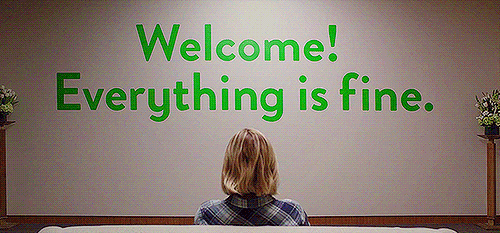
Neil has told us that his Tumblr posts aren't canon. He's also said:
"Never trust the storyteller. Only trust the story."
"Writers are liars, my dear, surely you know that by now? And yet, things need not have happened to be true. Tales and dreams are the shadow-truths that will endure when mere facts are dust and ashes, and forgot." -Both quotes are from The Sandman [link]
So here's my plea to whichever part of the fandom might read this: Stay Skeptical. It's wonderful to talk to Neil about his characters, the worlds he's created, his writing process, his views on world events, his sense of humor, his kindness, his compassion and empathy, and his good advice & encouragement for the entire range of the human experience. I respect him very much, and I'm thrilled he's here on social media talking to all of us. (Except he doesn't have social media, obviously. He's like Schrödinger's Social Media Neil-cat.)
I'm looking forward to all the surprises I'm certain are in store for us (and Aziraphale and Crowley) in Good Omens season 3. I trust Neil (and Terry!) to deliver our beloved characters to a very satisfying ending. But I don't trust Neil to honestly answer all of our questions on social media - and neither should you.
Especially not when he's already blamed obvious season 2 changes to the Bentley on the "lighting" (as just one example).
With lots of thanks to the members of the @ineffable-detective-agency - including @bbbitchvibbbez, @kimberleyjean, @maufungi, @noneorother, @theastrophysicistnextdoor, and @thebluestgreen for all their excellent fact-checking, ideas, and discussions!
Interested in diving further into all the Good Omens mysteries? I have more posts plus Clues and metas from all over the fandom, here.
#ineffable mystery#stay skeptical#meta lying#writers are liars#we're all detectives in this fandom#ineffable fandom#good omens fandom#good omens#good omens meta#good omens analysis#good omens speculation#good omens theory#neil gaiman#neil gaiman quotes#gnu terry pratchett#terry pratchett#gravity falls#alex hirsch#amazon prime#amazon marketing#good omens season 3#good omens season 2#good omens season 1#aziraphale#crowley#south downs cottage#Schrödinger's Social Media Neil-cat
60 notes
·
View notes
Text

Honey, You're Familiar: Chapter Three
(AO3) (Masterpost) (4625 Words)
A Steve Harrington x meta!Reader slowburn multichapter fic.
Summary: You befriend a psychic, give Steve a pep talk, and get the gang together.
---
You, Hopper and Joyce sit in the Byers’ living room.
“You kicked Lonnie out again then?” You ask.
“I found the pamphlet, right where you said it would be.” Joyce says furiously. “God, I can’t believe that bastard!”
“I’m sorry-” you begin.
“No, no, this is on me for even believing him in the first place!” Joyce fumes.
“Let’s focus on Will,” Hopper intervenes, trying to bring calm to the situation. “What do we do next?”
“You go to see Terry Ives,”
“Ives… why do I know that name?” Hopper mutters, before a look of horror dawns in his eyes. “The woman who said Dr Brenner took her kid, from the news report. So she was telling the truth all along?”
You nod solemnly. “Her child, Jane, is the girl who was seen at Benny’s diner, who has been hiding in Mike Wheeler’s basement the past week,”
“The one who’s been in the lab the whole time.”
“That’s right. I’m going to be meeting with her tonight, hopefully, which should set us up well for tomorrow.”
“And what’s happening tomorrow?” Joyce asks.
“Mike Wheeler’s going to jump off a cliff, Jonathan is going to punch a cop, and we might- might- just save your son,”
“Might?” Hopper questions.
“Just because I know the future, doesn’t mean I control it,” you reply with a shake of your head. “I’ve done everything I can to set us up for success, now we just have to hope that everything goes according to plan. Speaking of—”
You get up from the couch and head into Will’s room, reaching under the bed to find what you’re looking for. You pull out his walkie-talkie and head back to the adults. “—I need to take this.”
“But it's Will’s.” Joyce weakly protests.
“I know. And when we get him back tomorrow night, I will give it straight back, okay?” you pick your words carefully, and they have the intended effect of reassuring Joyce. She leans back into the sofa heavily.
“You can’t tell us anything else?” Hopper asks, still tense.
You pause. In the show, Hopper tells the lab where El is in exchange for letting him and Joyce go through the gate. You pray he will make a better choice in this reality. “We need to protect Eleven. We need to keep her away from those monsters at the lab, so keep her location a secret.”
You turn to Joyce and add: “And don’t be too hard on Jonathan when you get to the station. It's been a rough week for all of us,”
You go to leave but remember one last thing. “Do you have any children’s gloves?”
—
God it’s cold out. Now that the sun has completely set and the moon hangs in the sky, the November chill permeates the air, cooling you to the bone and making you shiver. The trees seem to shiver too as the wind bristles through them, filling the woods with a susurrus of leaves. The cold makes the scabbed gashes on your calf ache but you maintain your search. In the show, it’s implied that Eleven slept in the woods after the fight with Mike in the junkyard, but you just couldn’t let the poor girl suffer through that.
Eventually, you spot a flash of baby pink fabric.
“El! I’m not with the bad men or your papa, I’m a friend of Mike’s! Can we talk please?” You call out, hoping and praying that she dares to trust you.
You hear a rustle from behind a tree before the scruffy girl steps out. “Friend?” She asks, watching you with wide, owlish eyes.
“Yes, I’m a friend. I know you just had a fight with Mike and I want to help. You can’t stay out here all night, you’ll freeze,”
“You know? Know how?” Her eyes narrow as she wraps her arms around herself.
“It’s a little bit of a long story, will you come back to my home to talk? It’s warm and we can have something nice to eat,”
El hugs herself tighter, clearly feeling the chill but not trusting you enough to follow.
“Eleven, I promise I will do everything I can to keep the bad men away from you. You’re safe with me. Friends don’t lie, right?” taking a risk, you reach your hand out to her.
She walks towards you at an agonisingly slow pace, as if waiting for you to change your tune and attack. Her small hand slips into yours and you hiss under your breath as you feel her frozen fingers. Thank god for planning ahead.
“Here,” you offer, pulling the pair of gloves out of your jacket. El watches as you carefully pull them onto her hands and secure them around her wrists.
“Better?” you ask.
“Better,” she echoes.
—
Her eyes follow you in an unnerving way as you potter around your apartment. El is curled up on your armchair with a blanket while you prepare dinner for both of you.
“You know Mike?” she eventually asks, nervously, like she’s afraid of being told off for speaking. Your heart aches for her.
“I do! I know Dustin and Will and Lucas too. I work at an arcade, which is a building where you can go to play lots of games,” you explain.
“Lucas…” she whispers sadly. You head to her and crouch down before the armchair.
“El, you didn’t mean to hurt him. You’re not a monster. He and Mike were fighting, so you wanted them to stop, right?”
She nods her head cautiously, still confused by how you know all this.
“Exactly. And you used a bit too much power and threw Lucas a bit too far. Accidents happen, kiddo. You should still apologise when you next see him, just like he should apologise for saying those bad things about you, but it doesn’t make you a monster,”
“He’s right,” she says, tears now welling in her eyes as her breath catches in her chest. “The bad things. I lied. Lucas is right,”
You gather her in your arms as her tears turn to full blown sobs. She tenses for a long moment, before returning the hug tightly.
“El… Lucas is upset because his friend is missing. All he saw was you messing with the compasses, but he didn’t understand your intentions.”
“In-ten…”
“Intentions. It means he doesn’t know why you did it.”
“Keep them safe.”
“I know, kiddo. But they don’t know about the gate, or the monster. They don’t know how dangerous it is, so they don’t know what you’re trying to keep them safe from.”
“You know…?” El pulls back, looking at you cautiously again.
“About the gate and the monster? Yeah,” You say sadly. Your timer in the kitchen goes off, making El jump. “I’ll explain while we’re eating, okay? Food is important, I don’t want you getting hungry.”
El wolfs down your pasta bake like she hasn’t eaten in days. Which, to be fair, is almost the case. You doubt Mike was able to sneak her much.
You tell her about your home world, about the tv show, about the things you’ve changed. She listens attentively through it all.
“Here… why?” she eventually asks, pasta sauce around her mouth. You hand her a napkin, which she stares at in confusion, before you just reach over and wipe it off yourself.
“I don’t know why I’m here,” you admit. “It’s a little scary. I think it might have something to do with the Upside Down, but I came here before the gate was opened,”
“Help find out.” El says with determination, small face turning serious, and you can’t help but smile at her instinct to help.
“Thank you El, that’s really sweet of you. You’re a good kid.” You say, making her blush.
You get her to help you wash the dishes, letting her play with the soap suds that surround the sink. After, you get out some old pyjamas and offer them to her, but she looks at them unhappily.
“No,” she says, crossing her arms. It takes you a moment to guess why.
“I’m not going to take the dress away from you, kiddo. We can clean it up and you can put it back on tomorrow. This is just so you’re comfy and warm while you sleep.”
“Promise?”
“I promise, El. I won’t take the dress away from you.”
She takes the dress off and you prepare some warm water as she changes into the pyjamas. You get a cloth and wipe the dirt off the dress, tidying it up a little and leaving it on a hanger where El can see it. It isn’t as good as a full wash, but it’s still an improvement.
She eventually joins you in the bathroom.
“Can I wash your face?” You ask, showing her the sink of water and the cloth in your hand.
She touches the water and the cloth carefully before nodding slowly at you. Gently, you wipe over her face, removing both the dirt and the old makeup Mike had applied to her face yesterday. She watches you as you move the cloth around her face, carefully scrubbing at a clump of dirt that has nestled its way into her eyebrow.
“Pretty,” she says, looking at you past the washcloth.
“You think I’m pretty? Thank you, El,” you smile. “I think you’re really pretty too,”
She ducks her head at this, pulling away from the cloth. “Lie,” she mutters, embarrassed.
“Hey!” you say, encouraging her head back up so you can look her in the eye. “Friends don’t lie, El. You are really pretty,”
The girl runs an insecure hand over her scalp, but doesn’t duck her head again.
“So what if you don’t have any hair right now? It just means everyone can see your pretty eyes better,” You say, repeating a line your mom once told you when you accidentally cut your bangs too short. “Besides, hair grows back, kiddo. In fact, I know in the future, you have lovely curly hair,”
“Really?” she asks, wide eyed.
“Really,” you confirm. “Now stay still, I haven’t cleaned behind your ears,”
—
You wake up with visions of the demogorgon still haunting your mind, and a cramp in your mostly healed leg. You had given El your bed and slept curled up in your armchair. You limp over to the toaster and put in some eggos for you both.
“Hurt?” El asks, making you jump. She is peeking her head through the bedroom door which you had left open through the night.
“Uh, yeah. The demogorgon hurt me.”
“When?”
“Tuesday. The same day Mike spent the day with you and you saw the picture of Will.”
“Mike…”
“You’re gonna see him again today, kiddo. In fact, he’s gonna need your help. You remember the mouthbreathers from the middle school?”
She gets a mischievous smile as she thinks back to that day, giving you a nod.
“Well, they’re going to try and hurt Mike and Dustin. You’ll need to use your powers to save them.”
“Use powers?” She says, her eyes suddenly filling with doubt and fear. The toaster pops and you lead her to the table, handing her the plate of waffles.
“Your powers aren’t bad, El. You can use them to hurt people, yes, but you can also use them to help. And Mike will need your help today,”
—
You walk Eleven back to the woods, and show her where she can hide near the quarry until the time is right.
“Okay, today will be a little intense, so I need you to listen, alright? After you’ve helped Mike and Dustin you can stop by Mike’s house to resupply but you need to leave as soon as you can, okay? Your papa is going to come looking for you.”
“Papa?” El gasps, shoulders tensing, and you can’t help but wrap her in your arms once more.
“Yeah. But I promise we’re all going to do everything we can to keep him away from you, okay? Just make sure Mike and Dustin leave the house really quickly,”
“Okay,” she nods.
You lean back so you can look into her eyes. “I’ll meet up with you later today, alright? I promise. But you need to help Mike and Dustin on your own first.”
“You go where?”
“I need to go help some other people now, and then we’re all going to meet up together, alright? I will see you later.”
“You promise,” she states.
“That’s right, I do,” You smile at her, giving her one last hug before leaving her in her hiding place. As much as it kills you to leave her, she needs to do this on her own. The situation with Lucas has knocked her confidence. She needs to know that her powers can do good.
—
Your trek over to the police station takes you through town. In the parking lot of the furniture store, you spot a familiar looking car, with a familiar looking boy sulking while sat on the hood. You look at the town clock—do you have time for this? Just because Steve was one of your favourite characters, doesn’t mean you can ignore your responsibilities every time you see him- you need to be at the police station pretty soon. You look over again at the dejected figure, who seems to be making a tremendous effort to try and fade out of existence.
God damn it.
“Steve!” you call out, jogging over. “You look like hell,”
He stays quiet for long enough that it starts to worry you. He just holds his rapidly warming can of soda to his face and stares at the ground. Eventually, you hop up onto the hood of his car next to him, and sit in silence until he’s ready.
“I think I fucked up,” he eventually says.
“Want to talk about it?” you ask, gently.
“No. I just want—” he breaks off, running a frustrated hand through his hair. “I just- do you ever wish you were someone else? Like, a completely different person? I don’t know. It’s stupid,”
“It’s not stupid, I get it. Like you could just wipe the slate clean and start over, right?”
“Exactly,” he turns to you, finally making eye contact. His face looks even worse up close. “I just think I’ve fucked this all up, y’know? And if I were a different person, I could do it all differently. Do it better,”
“Why can’t you things differently while still being you?” you ask, encouraging him to get to the root of what he’s saying.
“Because! I’m me and everyone knows me. Everyone knows who Steve Harrington is,” He says his own name with venom.
“And who is Steve Harrington?”
He goes quiet again before responding. “An asshole.”
God he makes your heart break sometimes. You shuffle closer to him on the hood so you can lean into his shoulder. He always seemed like a touchy person on the show, and you hope that it will help ground him. The way he sags into your side seems to prove you right.
“I’ll admit,” You start, “You’ve done some pretty asshole-ish things. Was the graffiti on the marquee you?”
“Tommy,” He replies, “But I agreed. I had him stand on my shoulders so he could do it,”
“That sucks. I bet that really hurt Nancy.”
“Just because someone hurts me, I don’t have to hurt them back twice as bad, right?” he mutters darkly.
“Right,” you respond, a little surprised that he remembered what you said. “So what are you doing to fix it?”
“What?”
“You say you’re an asshole, but you’re just a person. A person who is making asshole-ish actions maybe—” you nudge him with a smirk and are happy to see him crack a little smile back, “—but you can choose to be different whenever you like.”
“It's not that easy!”
“It really, really is.” You put every ounce of sincerity you can manage into your words, watching Steve consider them. He fusses with his hair anxiously, hesitation lingering around him.
“People will- they’ll say things.”
“People like… Tommy and Carol?”
He hesitates another moment, then nods.
“Fuck Tommy and Carol!” you say, making him burst into a shocked laugh. “Who cares what those two miserable bitches think. Don’t let them drag you down with them.”
“They’re my only real friends…” Steve all but whispers, as if it's a shameful secret.
“They don’t seem like very ‘real’ friends to me,” you say firmly. “I’ve never had many friends either. I know it's scary to turn your back on them, but you’ll make more friends. Better friends,”
“You never had many friends?” Steve stares at you, aghast.
“Not the point I was trying to make, but yeah. I was alone for most of school.”
“But, why? You’re so nice,”
“I was bullied a lot. Most people didn’t want to be seen with me after that,”
“That’s stupid. They didn’t know what they were missing,” Steve says, with such seriousness that you almost believe it yourself.
“You’re sweet. Now stop trying to change the subject,” You shove him gently, making him laugh again. “You want to be a different person? Then make different choices.”
“I don’t know how,” he replies honestly.
“You’re smart, you’ll figure it out. But I’ll give you a hint. Spray paint is real annoying to scrub off a marquee,” You slide off the car and give him a smile. “I need to go, but I’ll see you around, yeah?”
Steve looks into your eyes with a small smile playing on his lips. “Yeah, see you around Y/n.”
—
Your conversation with Steve seems to have delayed you perfectly: from across the street you can see Hopper, Joyce, Barb, Nancy, and Jonathan bundled into the car, clearly arguing. Arguing about where the kids might be and how to find them. An argument you can put an end to.
You rap your knuckles on the window, making them all jump.
“Hey, let me in!” you call through the glass.
“Y/n?” Jonathan questions, not opening the door.
“Let her in kid, she knows everything,” Hopper says. Jonathan does and you squeeze into the already crowded backseat. “So, where are they?” he asks.
“Junkyard, but we’ll need to warn them we’re coming,” you say. Jonathan, Nancy and Barb look at you in astonishment. You’ll need to catch them up to speed.
“How are we supposed to warn them?” Joyce asks.
You pull out the walkie-talkie you took from under Will’s bed two nights ago and smile.
—
Once you’re close enough to the junkyard to be in range, you start talking. It's only you and Hopper left in the car, the others being dropped off at the Byers’ house to leave space for the kids.
“Hey. This is Y/n, from the arcade,” You speak into the walkie. “El, do you remember what I told you before I sent you to the quarry? About how we’d meet up later? I’m here with Chief Hopper. I know where you guys are and we’re heading there now. I’m not going to say where in case they can listen in, but Eleven knows that I’m telling the truth. We need you to meet with us when we call, okay? Do you copy?”
Silence. For 4, 5 seconds, then—
“This is Mike. We copy,”
You sag in relief. “See you soon, stay hidden until you hear us call, okay? And Dustin, this is not a Lando Calrissian situation!”
—
Hopper insists on you staying in the car while he takes out the three lab agents prowling the junkyard. You almost protest, but stop yourself. Those guys have real guns! You don’t have plot armor! You keep your head ducked below the dashboard until Hopper gives you a wave to let you know it’s safe.
You hop out the car and lead Hopper straight over to the abandoned school bus, knocking on the side of it.
“This is Y/n and Hopper! You’re safe to come out!” you call. The kids come scrambling out of their hiding places, looking at you and Hopper with wide, suspicious eyes.
Except for El. She immediately runs up to you, before awkwardly stopping. She looks up at you, looks at your arms, and shifts in place. Oh. She wants a hug.
You crouch down and wrap her in your arms, hearing her exhale in relief.
“You promised,” she says.
“I did. Me and the Chief are here to take you guys somewhere safe,” you say. “Well… safer, at least.”
“How do you know El?” Mike squares up with you, eyes narrowed.
“And how did you know about Lando?” Dustin adds, as if that is of equal importance.
You turn to Mike. “Where do you think she slept last night? I fetched her from the woods and we had a lovely girl’s night.”
Mike looks abashed, knowing he was the one who scared her off into the woods.
You turn to Dustin. “That one is a little harder to explain. Come on, we’ll talk back at the house,”
—
“So you’re from the future?” Dustin shouts in excitement.
“More like a parallel universe? But kind of, yeah.” you reply.
“Do we have flying cars yet?”
“No.”
“A Mars colony?”
“No.”
“Holograms?”
“No.”
“What about—”
“Enough!” Hopper yells, silencing the room. “Now that we’re all on the same page, what do we do next?” he asks, making everyone stare at you.
“Well… in the show El tries to contact Will here, but doesn’t have enough power. So everyone goes to the middle school to make a sensory deprivation bath to help her,”
“Why the middle school?” Lucas asks.
“We need the de-icing salt to make the water buoyant enough. You filled the Byers’ old kiddie pool,” At your words, Joyce leaves the room to go fetch it.
“Why do we even need to do this? Can’t you just tell us where he is?” Jonathan asks, frustrated. He hasn’t made full eye contact with you since you admitted you knew Will was going to be taken, hands clenched by his side.
“He was eventually found at the library in the version of the story I know. But do we know if that’s changed? If I tell you to go to the library and I’m wrong, you could get killed by the demogorgon before you ever reach him. We need to be sure.” you say firmly.
Glancing at Barb, you continue: “Besides, I’ve made changes in this world. I don’t know if that will change where he’s found.”
“What kind of changes?” Nancy asks.
You had tidily avoided mentioning your interference with Barb’s death in your original recap, focusing on Will’s disappearance and how you knew about it, but you suppose you were going to have to answer this question eventually.
“Barbara,” you say, looking at her cautiously. “You were going to be attacked by the demogorgon that night at Steve’s house, by the pool. I lured it away.”
“Attacked…” Barb repeats, sensing the hidden meaning in your words. You give her a guilty half-smile.
“You fought that thing?” Dustin asks, wide eyed.
“Less ‘fought’ and more ‘biked away from it while crying’, but yeah,” you respond, ducking your head.
“She told me about why Lonnie was really here, too,” Joyce adds, throwing down the old kiddie pool and rejoining the group. “Helped me find his damn lawyer pamphlet so I could kick him out after the wake.”
“Lawyer pamphlet?” Jonathan repeats.
Joyce looks at him guiltily. “He wanted to sue the quarry. That’s why he came back,”
Jonathan ducks his head, hiding his anger, and you watch Nancy place a hand on his back in comfort.
“We need to move, we have the pool. Let's go,” Hopper says, making everyone stand up and herd into the various cars.
You end up in a car with most of the kids and Hopper. El stays stuck to your side, and Mike stays stuck to hers. Dustin and Lucas have a brief argument over who else gets to ride with you before Hopper yells at them to hurry up and Dustin scurries off in defeat.
“You guys ever wanted to break into your middle school?” You turn back in your seat to ask them, making the boys’ eyes light up.
—
At the school, Barb pulls you away from the group. You’re on the hunt for duct tape to help black-out some goggles that Joyce had found in the science room.
“So… I’m supposed to be dead,” she starts as she leads you towards a maintenance closet.
“That’s what happens in the show.” you say nervously, unsure of where she might be going with this.
“How does it happen?” she asks.
“I’m not sure if I should-”
“Just tell me,” she says bluntly, cutting you off and staring you down.
You sigh. “Nancy and Steve go upstairs to dry off after jumping in the pool. You say you’re not having fun, Nancy tells you to leave. You go out and sit by the pool and the blood from where you cut yourself attracts the demogorgon. It drags you to the Upside Down and you’re dead within minutes.”
It’s not a fun story to tell.
“Just like that?” Barb asks.
“Just like that,” You confirm. “Nancy goes off the deep end trying to get answers. She investigates the woods, she talks to the police, she does everything she can to try and find you. In the show, El isn’t just in the bath to try and contact Will. She tries to contact you, too,”
“But I’m dead,” Barb concludes, clearly upset. “How come Will can be saved but I can’t?”
“I don’t know. The demogorgon kills most of the people it takes. Will just got lucky,”
“So it isn’t just me?”
“What do you mean?”
“It isn’t just me that gets killed. I’m not the only one who couldn’t survive it,”
Ah. That’s what this is about. You stop walking and face her properly.
“Barb, this thing is a killing machine. The fact that Will has survived this long is the exception, not the rule. Two hunters, Dale and Henry, were killed by this thing a few days ago. Two grown men, probably both armed, and they couldn’t fight this thing. You’re not weak for dying to it.”
She sighs and leans against the corridor wall.
“I saw it. That night when I was meant to die. I was getting into my car when I felt like something was watching me. It made my lights go out, chased me along the side of the road for almost a mile,” she stops and chokes a breath, trying to calm down. “I was so scared, I was crying but I didn’t want to pull over in case it caught up,”
She puts her head in her hands, taking deep breaths. You put a hand on her arm in comfort.
“I don’t know how I’m supposed to do this,” she says. “Knowing that that thing is out there. I’m not even supposed to be here, how am I supposed to help?”
“If it helps, I’m not supposed to be here either,” you murmur, at a loss on what to say.
She huffs out a bitter laugh. “Why didn’t you just run?” she asks. “You could have just kept your head down and not gotten involved, no one would blame you,”
“The same reason you’re not running, I suppose,” you reply quietly.
The two of you stare at each other for several moments, before she gives you a nod and continues walking down the hall to the maintenance closet.
“Are you coming?” she calls over her shoulder to you.
You jog to catch up, feeling like you’ve achieved a kinship with the girl.
#I hope you enjoy! I really liked the scenes with Steve and El in this chap#honey you're familiar#steve harrington x reader#steve harrington x you#steve harrington fanfiction#stranger things x reader#stranger things x you#stranger things fanfiction#x reader
12 notes
·
View notes
Text
Scale down
I have been thinking about what this concept in the Sydcarmy universe would look like if played out next season because that's where Carmy is going.

But I have a very hard time thinking of Carmy as a separate entity now, he's eternally intertwined in the tapestry he has been weaving with Sydney since she came into his life, and that's why his story restarted with her, she's his reset:

She's his chance to do it all differently this time around, not like when his relationship with Michael got fucked up. But even though he's trying, old habits die hard, and despite his heart being in the right place, he succumbed to his old default ways because apologies don't cut it anymore.


More about that here:
I believe The Bear's Legacy is about The Bear's found family branching out like Carmy's lines foreshadowed in 03x07 Legacy, because duh!
But in terms of Carmy as an individual, I think he's heading to a place where he will strip everything away and focus on what truly matters for him, which will lead us straight to SYDCARMY ENDGAME and I have already been talking about what this might entail, both in previous meta posts and in my fics:
This doesn't mean they won't get the star, no. In fact, I know they will, but they will get it when they are no longer chasing it and maybe once they do Carmy will decide he has had enough and diversify to other forms of art/outlets for his creativity because he said that "fixing" that restaurant (The Beef) was a way to fix the family
and he expresses himself through creativity.
So I'm expecting Carmy to walk from The Bear post-star either full or at least part-time and I'm also expecting Syd's dream spot to happen, (maybe in a time jump?) where she's gonna cook for people and make them happy



And that will result in them only focusing on what truly matters:
For Carmy that means this:

And this:

For Syd it means this:

And this:

Find any similarities between what truly matters for Carmy and for Syd and therefore what a happy ending would look like for both of them?
Me too.
Remember to follow my tag #Gingerpovs 💋
#the bear#sydcarmy#what matters for them is each other#THEY are the people and the family they formed together#sydcarmy meta#sydcarmy endgame#carmy berzatto#sydney adamu#the bear fx#carmy x sydney#carmen berzatto#the bear season 3#the bear hulu#syd x carmen#gingerpovs#the bear season 4 gingerpredictions#THE BEAR SEASON 4#the bear meta
19 notes
·
View notes